Session 2009/2010
First Report
Public Accounts Committee
Report on the Investigation
of Suspected Contract Fraud
TOGETHER WITH THE MINUTES OF PROCEEDINGS OF THE COMMITTEE
RELATING TO THE REPORT AND THE MINUTES OF EVIDENCE
Ordered by The Public Accounts Committee to be printed 2 July 2009.
Report: 01/09/10 Public Accounts Committee
This document is available in a range of alternative formats.
For more information please contact the
Northern Ireland Assembly, Printed Paper Office,
Parliament Buildings, Stormont, Belfast, BT4 3XX
Tel: 028 9052 1078
Membership and Powers
The Public Accounts Committee is a Standing Committee established in accordance with Standing Orders under Section 60(3) of the Northern Ireland Act 1998. It is the statutory function of the Public Accounts Committee to consider the accounts and reports of the Comptroller and Auditor General laid before the Assembly.
The Public Accounts Committee is appointed under Assembly Standing Order No. 51 of the Standing Orders for the Northern Ireland Assembly. It has the power to send for persons, papers and records and to report from time to time. Neither the Chairperson nor Deputy Chairperson of the Committee shall be a member of the same political party as the Minister of Finance and Personnel or of any junior minister appointed to the Department of Finance and Personnel.
The Committee has 11 members including a Chairperson and Deputy Chairperson and a quorum of 5.
The membership of the Committee since 9 May 2007 has been as follows:
Mr Paul Maskey*** (Chairperson)
Mr Roy Beggs (Deputy Chairperson)
Mr Thomas Burns** Ms Dawn Purvis
Mr Jonathan Craig Mr George Robinson****
Mr John Dallat Mr Jim Shannon*****
Mr Trevor Lunn Mr Jim Wells*
Mr Mitchel McLaughlin
* Mr Mickey Brady replaced Mr Willie Clarke on 1 October 2007
* Mr Ian McCrea replaced Mr Mickey Brady on 21 January 2008
* Mr Jim Wells replaced Mr Ian McCrea on 26 May 2008
** Mr Thomas Burns replaced Mr Patsy McGlone on 4 March 2008
***Mr Paul Maskey replaced Mr John O’Dowd on 20 May 2008
****Mr George Robinson replaced Mr Simon Hamilton on 15 September 2008
*****Mr Jim Shannon replaced Mr David Hilditch on 15 September 2008
Table of Contents
List of abbreviations used in the Report
Report
Improving Maintenance Procurement
The Investigation of Contract Fraud
Appendix 1:
Minutes of Proceedings
Appendix 2:
Minutes of Evidence
Appendix 3:
Correspondence of 28 April 2009 from Mr Howard Ingram.
Chairperson’s letter of 26 May 2009 to Mr Howard Ingram.
Chairperson’s letter of 29 May 2009 to Mr Paul Sweeney,Accounting Officer, Department of Culture, Arts and Leisure.
Chairperson’s Letter of 29 May 2009 to Mr Will Haire Accounting Officer, Department of Education.
Correspondence of 12 June 2009 from Mr Will Haire, Accounting Officer, Department of Education.
Correspondence of 23 June 2009 from Mr Howard Ingram.
Appendix 4:
List of Witnesses
List of Abbreviations used in the Report
BELB Belfast Education and Library Board
C&AG Comptroller and Auditor General
COPE(s) Centre(s) of Procurement Expertise
DCAL Department of Culture, Arts and Leisure
The Department Department of Education
Boards Education and Library Boards
ESA Education and Skills Authority
CORGI Council for Registered Gas Installers
OFT Office of Fair Trading
PAC Public Accounts Committee
Executive Summary
Overall Conclusions
1. The Committee considered the investigation of suspected fraud within the Property Services Unit of the Belfast Education and Library Board (BELB). This is one of the most worrying cases the Committee examined in terms of the failure of the public body to recognise the extent to which it was vulnerable to fraud and its slowness to respond as evidence of malpractice accumulated over the years. However, the Committee believes that this is not unique to BELB and there is a challenge for management throughout the public sector, wherever there is substantial expenditure on maintenance contracts, to ensure that robust procurement procedures safeguard public funds.
2. Very large sums of money are spent by public bodies on work by maintenance contractors. The Committee is aware of a £200 million backlog in maintenance work in schools which has resulted in significant deficiencies in the schools’ estate. It is vital that the limited budgets available to remedy these deficiencies are spent for the benefit of children, not contractors. In the current economic circumstances, all public officials must ensure that maintenance procurement is carried out on the basis of fair competition and that it delivers value for money.
3. The annual procurement spend by Northern Ireland Government is £2.2 billion. Even if only a small proportion of this spend is fraudulent very significant sums of public money are potentially lost. It is therefore crucial that the lessons learned in this report are applied throughout the public sector.
Improving Maintenance Procurement
4. The Committee notes that there was extensive evidence of a long-standing culture within BELB’s Property Services Unit that favoured certain contractors and had no regard for proper procurement procedures. When management recognises that it has a deep rooted cultural problem it is not sufficient to issue directives from on high, however comprehensively these are worded. The requirement is to drive a programme of structured cultural change in the area concerned.
5. The Committee notes a wide range of examples of alarmingly poor value for money in maintenance procurement in BELB. The Committee recognises that partnerships with private sector contractors and suppliers are essential for the delivery of public services and, properly administered, offer substantial efficiency gains. However, the interface between public bodies and their contractors needs to be handled professionally with proper regard for good procurement practice. In particular, ensuring that there is genuine competition between contractors, and that contracts are fairly awarded, is essential in achieving value for money. Those responsible for purchasing functions need to be alert to, and to check for, evidence of collusion between groups of bidders or between bidders and officials who are in a position to influence the placing of orders. It is also important that any concerns about suspected impropriety are investigated thoroughly and promptly.
6. The Committee finds it disturbing that management’s attention had been brought to weaknesses in the controls operating in BELB’s Property Services Unit by Internal Audit in a series of reports between 1997 and 2002, but no effective action was taken.
7. One BELB maintenance officer was involved in the award of £64,000 worth of maintenance work to his uncle’s firm. The Committee was told that this relationship was known both to the employee’s supervisor and to senior management, including the Chief Executive. The Committee considers that the BELB’s own instructions on dealing with conflicts of interest, issued in 2001, sent exactly the right message to staff on how to handle them. However, the Committee found it most disappointing that, in practice, these instructions were ignored and that this happened with the knowledge of senior management.
8. Another maintenance officer accepted a four-day visit to Italy arranged by a Northern Ireland supplier. The Chief Executive told us that his concern was that “the trip could be perceived as a junket". It is clear to the Committee that this is something of an understatement - of course this was a junket. It is extremely disappointing that public servants accepted generous hospitality from a third party who might well have expected to gain from future Board contracts.
9. The Committee is very concerned to read the Counter Fraud Unit’s conclusion that maintenance supervisors “appear to have abdicated any role in verifying invoices approved by their maintenance officers". Supervisory checks are a key control in this area and it is for management to ensure this control is operating effectively. The Committee notes that none of the supervisors’ line managers were subject to disciplinary action.
10. In August 2005, BELB identified that it had paid £80,000 for disability access work in Whitewell and Oldpark libraries which had never been started. When BELB reviewed work undertaken in other libraries it found that £110,000 had also been paid for work in 14 other libraries which was either not carried out or was not carried out to the required standard. The Committee is very disturbed by the photographs contained in the C&AG’s report. The work was so poor it had created a health and safety hazard and may well have damaged the structure of the building.
11. Every householder knows that, in commissioning maintenance work on buildings, they need to be alert to the dangers of unscruprulous contractors. While any contractor who secures a public sector tender should have been subject to careful quality checks, these are never a substitute for careful supervision of work done over the period of the contract and, most importantly, confirmation that work has been satisfactorily completed prior to payment. In the libraries case, the fact that very large amounts of money were paid out to contractors, months in advance of any work starting, underlines for the Committee that the culture in BELB was woefully deficient in safeguarding the taxpayer’s interest. The Committee is not surprised that there were strong suspicions of fraud in this case, even though extensive investigations were unable to establish evidence which would support criminal prosecutions.
12. The Committee is shocked to discover the absence of normal procurement procedures in BELB given that it has been an accredited Centre of Procurement Expertise (COPE) since 2002. The Committee considers that the public would have drawn confidence from the award of COPE status and it is vital that the assessment of this status is independent and rigorous. COPEs which demonstrate persistent poor practice should have their status removed, if the concept of a ‘Centre of Procurement Expertise’ is to mean anything.
13. The Committee notes with concern the comments from Central Procurement Directorate of the Department of Finance and Personnel (DFP) that “it may be inappropriate for Centres of Procurement Expertise to share specific experiences of poor performance." The Committee disagrees strongly with this view. The public sector must put itself in a position to act as an intelligent purchaser and safeguard public funds by sharing its experience of very poorly performing contractors and take this information into account when awarding future public sector contracts.
The Investigation of Contract Fraud
14. The Department of Education (the Department) confirmed that BELB received a wide range of anti-fraud and procurement guidance from DFP and it simply was not followed in the cases the Committee examined. BELB had developed an anti-fraud policy and fraud response plan in 2000, but the policy, particularly in relation to line managers’ responsibilities, was not fully implemented.
15. This is not the first time that the Committee has emphasised the important role that whistleblowers have in the identification of potentially fraudulent activity. The Committee is disturbed to find that BELB did not effectively handle the investigations of two earlier anonymous letters, which had raised concerns of corruption and bid rigging. The schools’ maintenance case study strongly underlines the importance of investigating any concerns promptly and professionally. The Committee notes that the leads provided by the whistleblower in this case did not ultimately produce the level of evidence needed to pursue prosecutions. In the Committee’s view, the failure at the outset to have a properly resourced investigation may well have contributed to the inability to bring criminal or civil charges in this case.
16. The Committee recognises that, generally, the interventions of the Department were well directed at strengthening the investigation process and trying to ensure that it was as effective as possible.
17. Three officers in the schools case study faced disciplinary charges. The Department’s expert in disciplinary matters concluded that the relationship of two of these officers with a contractor “represented gross misconduct". The Committee is concerned that the Disciplinary Panel downgraded the offences from gross misconduct to misconduct. The two officers received a formal written warning. In the libraries case, another officer received a final written warning for serious misconduct. In all cases these warnings were removed from their records after one year. In the Committee’s view, the public perception of these disciplinary measures, when they are removed after a relatively short time, is that they are too light.
18. In the libraries case the officer managing the project was suspended on full pay in 2005 and his employment terminated in 2007 on ill health grounds and the disciplinary hearing against him was wound up. This is a matter of concern, as this is not the first case the Committee has come across where disciplinary action has been stopped on medical grounds.
19. In both case studies the Committee found that the failure to implement proper procedures and the absence of documentation had undermined the prospect of criminal charges being brought. The Committee recognises that this makes redress much more difficult. Nevertheless, it is important that every possible action is taken to recover sums overpaid or paid for work not done.
20. The Committee is pleased that the Department has sought to learn lessons from its performance in investigating the whistleblower’s allegations. The witnesses recognised that the investigation took too long to reach a conclusion and should have been taken forward more rapidly. The Committee agrees with this assessment. It should not have been necessary to undertake more than one investigation into the schools maintenance case study. A properly resourced and planned investigation should have been sufficient to deal with the matter authoritatively.
Summary of Recommendations
The Improvement of Maintenance Procurement
Recommendation 1
1. The Department of Education has required each Education and Library Board’s (Board’s) Internal Audit Unit to review procurement in the light of this case. The Committee recommends that all public bodies with annual maintenance procurement of more than £1 million should conduct a similar review against the lessons emerging from this report. The Committee would ask the Audit Office to confirm that these reviews have been completed as part of its audit of next year’s accounts and to report back on any omissions. Others with lesser budgets should consider appropriate lessons for themselves. (see paragraph 8)
Recommendation 2
2. Where there is evidence of longstanding poor practice which puts public funds at risk, the Committee recommends that the public bodies are alert to the need to address the underlying culture in the units concerned as well as to improve procedures. In the Committee’s view, the keys to this are leadership to drive up standards, good supervisory management to ensure that rules are applied and appropriate disciplinary action when failures occur. (see paragraph 10)
Recommendation 3
3. The Committee recommends that when any public body receives a report from an Internal Audit unit which indicates that key controls are inadequate, and there is repeated failure to apply the procedures which are safeguarding against fraud and impropriety, management must set itself the task of tackling this with the highest priority within a short, targeted timeframe. In addition, Internal Audit should be asked to give assurances that this has been completed. (see paragraph 12)
Recommendation 4
4. The Committee recommends that in areas of expenditure such as maintenance contracts, which have been recognised as vulnerable to abuse, management must ensure that staff are alert to the need to challenge any instances of poor value for money and are encouraged and empowered to do so. (see paragraph 16)
Recommendation 5
5. The Committee considers that the 2001 instructions on dealing with conflicts of interest sent exactly the right message to staff; it is therefore extremely disappointing to learn that, in practice, these instructions were ignored and that this happened with the knowledge of senior management. The Committee insists that not only must there be clear instructions about the handling of conflicts of interest but, senior management must enforce zero tolerance of any perception of impropriety. (see paragraph 20)
Recommendation 6
6. The Committee recommends that there should be regular awareness training on the standards in public life for all staff involved in procurement, and guidance on gifts and hospitality should be re-issued annually to procurement staff. (see paragraph 23)
Recommendation 7
7. The Committee recommends that when engaging contractors who are required to have a specialist qualification/registration, particularly where there is a health and safety element to the work, this requirement must be written into the terms of the contract and documentary evidence inspected before the contract is signed. (see paragraph 25)
Recommendation 8
8. The Committee recommends that public bodies managing maintenance procurement must ensure that there is adequate supervision of staff who let, manage and monitor maintenance contracts. Maintenance officers must carryout regular inspections of contractors’ work, involving, if appropriate, specialist staff, such as surveyors. Supervisors and managers should carryout random checks of work against the job specification. There should be no job, no matter how small in value, which could not be selected for checking by a supervisor. All work inspected and the results of all inspections should be recorded. Certification of invoices for payment should be based on proper validation that the work was carried out. It is extremely disappointing that the Committee finds it necessary to spell out these elementary points of good practice. (see paragraph 28)
Recommendation 9
9. The Committee is seriously concerned that BELB failed to obtain Building Control approval and may have put at risk the safety of the public and the preservation of public property. In the Committee’s opinion, it should not be left to the discretion of individual maintenance officers when, or if, Building Control approval is obtained. The Committee recommends that DFP ascertain whether this is a wider problem and, if necessary, require that all public bodies to review their systems and procedures for obtaining Building Control approval. (see paragraph 32)
Recommendation 10
10. The Committee would emphasise that the standard of proof required to act against poor contractors is not equivalent to that required in a criminal case. The public sector must be able to share its experience of poorly performing contractors and to take this into account when awarding future public sector contracts. If the guidance on this is not clear, or if there are perceived legal impediments, the Committee would like a report back from DFP on what needs to be done to strengthen the public bodies’ ability to take account of the track record of contractors working across the public sector. (see paragraph 34)
Recommendation 11
11. A key step in ensuring value for money in maintenance contracts is the appointment of competent contractors in the first place. The Committee recommends that public bodies should ensure that a wide range of firms are attracted to compete, and that tenders/quotes for maintenance work must be properly evaluated by trained and competent staff with an appropriate emphasis on quality as well as price. (see paragraph 35)
Recommendation 12
12. The Committee recommends that public bodies engaged in maintenance procurement ensure that locally based staff are used, where appropriate, to assist in assessing the quality of maintenance work undertaken on their premises. (see paragraph 37)
Recommendation 13
13. The Committee insists that public bodies must not set aside key safeguards for ensuring value for money simply to make sure that funding is spent before the year end. (see paragraph 39)
Recommendation 14
14. The circumstances of this case made the Committee question what one would have to be guilty of to lose accreditation as a Centre of Procurement Expertise (COPE). The Committee recommends that COPEs which demonstrate persistent poor practice should have their status removed, if the concept of a “Centre of Procurement Expertise" is to mean anything. (see paragraph 44)
Recommendation 15
15. The Committee notes the COPE status of the Education and Skills Authority (ESA) will be reviewed within a year of its establishment. Given the scale of the historic problems within BELB, the Committee recommends that this assessment of COPE status must be rigorous and independent. (see paragraph 46)
Recommendation 16
16. The Committee recommends that ESA draws up an Action Plan for maintenance procurement, drawing on the recommendations of this report. (see paragraph 48)
The Investigation of Contract Fraud
Recommendation 17
17. 17. The Committee recommends that there must be absolute clarity in every area of public purchasing that there are no circumstances where it is acceptable to solicit or provide invoices stating that work has been done where it has not. (see paragraph 51)
Recommendation 18
18. It is pointless issuing anti-fraud guidance unless it is properly implemented. The Committee recommends that all public bodies should periodically revisit their anti-fraud guidance, including the safeguards and checks on bid-rigging, and ensure that these are being implemented effectively. (see paragraph 58)
Recommendation 19
19. The whistleblower’s role was central to triggering the investigation in this case. The Committee recommends that Audit Committees be informed of any whistleblowing cases and how they are handled, and that DFP take the opportunity to draw attention to this case in its next Annual Fraud Return, and that any future training on fraud awareness pays particular attention to the value and effective use of whistleblower information. (see paragraph 63)
Recommendation 20
20. The Committee recommends that whenever a sponsored body is investigating allegations of serious suspected fraud, the sponsoring department should ensure that its own expertise is available and whatever other expertise is required, to assist in the investigation, and the department’s Accounting Officer must, of course, be satisfied that the process is thorough and professional. (see paragraph 65)
Recommendation 21
21. The Committee has made it clear that it expects public bodies to operate effective whistleblowing policies; proactively encourage and promote those policies; and rigorously investigate all whistleblowing concerns. The Committee recommends that DFP should draw attention to the Department’s handling of this whistleblower as a model for any future cases. (see paragraph 68)
Recommendation 22
22. The Committee is very concerned that it has to repeat a previous recommendation that all members of an investigation team, including its leader, should be totally independent of the management of the business unit where the fraud or suspected fraud occurs. (see paragraph 71)
Recommendation 23
23. BELB should have initiated independent investigations of these letters which could have dealt with the matter properly. The Committee recommends that where a whistleblower makes serious allegations of fraud, management must respond by conducting an appropriate investigation. (see paragraph 74)
Recommendation 24
24. Fraud Risk Registers are living documents that provide snapshots over time of an organisation’s management of fraud risk in the face of changing circumstances. The starting point for the creation of the Risk Register is a proper fraud risk assessment. The Committee recommends that every public body with maintenance expenditure in excess of £1 million per annum should ensure that the risk of fraud in this area is specifically dealt with in its risk assessment, and the outcome reflected in its Risk Register. (see paragraph 78)
Recommendation 25
25. The Committee recommends that any anomalies in disciplinary procedures in the public sector are reviewed and addressed appropriately. (see paragraph 81)
Recommendation 26
26. The Committee recommends that where there is strong evidence of wilful neglect of duty by staff, management should be prepared to place considerable weight on facts of this nature, as evidence of possible gross misconduct. To do otherwise does not send the right signal to staff. In addition, DFP should consider whether sponsoring departments should be represented on disciplinary panels, where suspected fraud is under consideration in their arm’s-length bodies, to add the weight of their greater experience in handling such serious issues. (see paragraph 83)
Recommendation 27
27. The Committee recommends that DFP should review a sample of cases from across the public sector of early retirements for reasons of ill-health or inefficiency where disciplinary proceedings are outstanding. The purpose of the review should be to identify whether there is scope to speed up disciplinary proceedings or to improve the handling of such cases, including early notification to Occupation Health Service that a disciplinary/grievance process is under way, and analysis of the implications for line management. The Committee would like to know the outcome of this review. (see paragraph 86)
Recommendation 28
28. This Committee has already recommended that whistleblowers should be encouraged and supported to engender a healthy anti-fraud culture. It is also important however, that public sector leaders ensure that staff whose actions lead to the identification of potential fraud and impropriety are explicitly commended, and the Committee recommends that their efforts are recognised appropriately. (see paragraph 88)
Recommendation 29
29. The Committee recommends that BELB should consider pursuing legal action in respect of other library works not done, or not carried out to the required standard. The Committee would like to be kept informed of progress. (see paragraph 91)
Recommendation 30
30. The Committee welcomes the transparency of the Department’s new fraud reporting procedures and recommends that there should be close liaison with DFP’s Fraud Forum to promote the good practice arising from the Department’s Review and to circulate the Review’s recommendations widely across the public sector. (see paragraph 96)
Introduction
1. The Public Accounts Committee (the Committee) met on 28 May 2009 to consider the Comptroller and Auditor General’s report on “The Investigation of Suspected Contract Fraud" (NIA 103/08-09). The witnesses were:
- Mr Will Haire, Accounting Officer, Department of Education (the Department);
- Mr Paul Sweeney, Accounting Officer, Department of Culture, Arts and Leisure (DCAL);
- Mr David Cargo, Chief Executive, Belfast Education and Library Board (BELB);
- Mr John McGrath, Deputy Secretary Resources and Accountability, Department of Education;
- Mr John Dowdall CB, Comptroller and Auditor General (C&AG); and
- Mr David Thomson, Treasury Officer of Accounts, Department of Finance and Personnel (DFP).
The Committee wrote to Mr Haire and Mr Sweeney on 29 May 2008 with further queries, and they replied on 12 June 2009.
2. In August 2003, a whistleblower alleged that a price-fixing cartel was operating against the Belfast Education and Library Board (BELB) and that the cartel colluded with a number of BELB maintenance officers in the award of schools maintenance work. The whistleblower also alleged that these officers accepted inducements to award maintenance work to favoured contractors. The resulting investigations uncovered significant failings in maintenance procurement including poor value for money, conflict of interest concerns and evidence of favouritism towards certain contractors. The investigations were overseen by the Department of Education (the Department).
3. In August 2005, BELB uncovered a suspected fraud at two of its library building works. Physical inspections showed that building work, for which the contractors had been paid £80,000, had not been started. BELB also discovered that work at its other libraries, for which it had paid £110,000, had not been done, or had not been completed to an acceptable standard. The work was funded by the Department of Culture, Arts and Leisure (DCAL) and was intended to bring libraries into compliance with the access requirements of the Disability Discrimination Act.
4. In taking evidence, the Committee focused on two key areas. These were:
- improving maintenance procurement; and
- the investigation of contract fraud.
Improving Maintenance Procurement
General Findings
5. Fraud is an insidious crime, and property maintenance within the public sector has long been regarded as carrying a high risk of fraud, corruption and other irregularity. Public bodies are expected to be alert to these risks, have formal procedures to deter attempted fraud and enforce detection and respond vigorously to any evidence of impropriety.
6. Against this background BELB’s handling of issues arising from whistleblowers’ allegations of price-fixing and collusion in schools maintenance expenditure, from 1998 onwards, is deeply disturbing. This is one of the most worrying cases the Committee has considered in terms of the failure of the public body to recognise the extent to which it was vulnerable to fraud and its slowness to respond as evidence of malpractice accumulated over the years. However, the Committee believes that this is not uniquely a problem in BELB and that there is a challenge for management throughout the public sector, wherever there is substantial expenditure on maintenance contracts, to ensure that robust procurement procedures safeguard public funds.
7. The Committee recognises that it was very helpful in terms of progressing the session that the witnesses readily acknowledged the serious shortcomings and the handling of maintenance contracts in this case. It is important that senior management and Accounting Officers take responsibility for long standing weaknesses on this scale but also, as in this case, apply their experience to assist the Committee to identify what can be done to reduce the incidence of such problems in future.
Recommendation 1
8. The Department has required each Education and Library Board’s (Board’s) Internal Audit Unit to review procurement in the light of this case. The Committee recommends that all public bodies with annual maintenance procurement of more than £1 million should conduct a similar review against the lessons emerging from this report. The Committee asks the Audit Office to confirm that these reviews have been completed as part of its audit of next year’s accounts and to report back on any omissions. Others with lesser budgets should consider appropriate lessons for themselves.
9. BELB had introduced revised maintenance procurement procedures in 1998, but this failed to address the culture within its Property Services Unit, and weaknesses continued for too long. The Committee notes that there was extensive evidence of a culture within the Property Services Unit that favoured certain contractors and had no regard for proper procurement procedures. The Committee listened carefully to the Chief Executive’s account of the actions he has taken in this area from 1998. The concern, however, is that seven years later these actions had still not resulted in the change in culture that was necessary to reduce the potential for fraud in contract maintenance work. The lesson from this is that, when management recognises that it has a deep rooted cultural problem, it is not sufficient to issue directives from on high however comprehensively these are worded. The requirement is to drive a programme of structured cultural change in the area concerned. The Committee recognise, of course, that as the Chief Executive explained, people will “sometimes let you down" and there is also a need, therefore, for appropriate disciplinary action where failures occur.
Recommendation 2
10. Where there is evidence of longstanding poor practice which puts public funds at risk, the Committee recommends that the public bodies are alert to the need to address the underlying culture in the units concerned, as well as to improve procedures. In the Committee’s view, the keys to this are leadership to drive up standards, good supervisory management to ensure that rules are applied and appropriate disciplinary action when failures occur.
Internal Audit raised concerns that a core group of contractors was awarded most maintenance work but no effective action was taken
11. BELB’s Internal Audit Unit produced a series of reports between 1997 and 2002 which found that a core group of contractors was allocated the majority of the work in certain areas of maintenance work. What is disturbing is the extent to which Internal Audit brought these weaknesses in control to management’s attention, only for no effective action to be taken. This calls into question whether Internal Audit within BELB was accorded sufficient status to ensure that important recommendations were implemented.
Recommendation 3
12. The Committee recommends that when any public body receives a report from an Internal Audit Unit which indicates that key controls are inadequate, and there is repeated failure to apply the procedures which are safeguarding against fraud and impropriety, management must set itself the task of tackling this with the highest priority within a short, targeted timeframe. In addition, Internal Audit should be asked to give assurances that this has been completed.
Maintenance procurement in BELB had insufficient regard for value for money
13. The procurement procedures used by BELB between 1998 and 2006 were unlikely ever to have delivered value for money. Contractors could charge their trade associations’ hourly rates, plus a mark-up of 85% to cover the contractors’ overheads and profit. The Chief Executive told the Committee that this practice was “generally accepted at that time". It is difficult to understand how such an inherently flawed system could have continued, without question, until 2006.
14. The Committee noted a wide range of examples of alarmingly poor value for money. In one instance a contractor charged eight hours each for a plumber and an assistant to plumb a washing machine at a total cost of £266. Moreover, most work was allocated to the firm that charged the highest rates, a contractor who charged 43% more than the hourly rate of the cheapest contractor, yet both had passed the quality assessment before their appointment. The Committee welcomes the Accounting Officer’s recognition that this was clearly not good practice. He reassured the Committee that processes have been changed to focus on value for money.
15. The Chief Executive explained that the appointment of a number of quantity surveyors had allowed a much greater focus on ensuring value for money. However, it seems to the Committee that overcharging by certain contractors was so blatant it should not have taken a quantity surveyor to spot it – any member of maintenance staff or finance staff coming across grossly inflated invoices should be capable of challenging them.
Recommendation 4
16. The Committee recommends that in areas of expenditure such as maintenance contracts, which have been recognised as vulnerable to abuse, management must ensure that staff are alert to the need to challenge any instances of poor value for money and are encouraged and empowered to do so.
There was evidence of favouritism towards certain contractors, and procedures to address conflicts of interest were ignored
17. BELB Internal Audit investigations arising from a whistleblower’s allegations in 2003 found that two contractors were consistently awarded the majority of jobs. The contractors were awarded 50% of response maintenance work and 73% of emergency work. A consultant employed by the Department to investigate aspects of the case concluded that two BELB officers had favoured one of these contractors. These officers were subsequently disciplined for misconduct, in part due to their failure to follow instructions to rotate contractors on an equitable basis. When the Committee pressed the Accounting Officer on whether there had been favouritism, he said that while it was a concern, nothing had been pinned down. He added that while he would like to know whether favouritism had happened, “the fact that our process was open and left the threat of poor value for money is as bad as something actually going wrong". The Committee welcomes these comments.
18. In a 17 month period between April 2002 and August 2003, a Maintenance Officer, referred to in the C&AG’s report as Officer D, was involved in the award of £64,000 worth of maintenance work to his uncle’s firm. The officer had declared the conflict of interest to BELB on his appointment. The Committee was told that this relationship was known both to the employee’s supervisor and to senior management including the Chief Executive himself. The Committee was also told that this conflict was managed, in that there was a clear segregation of duties; while Officer D did not allocate work or approve payments, he did however approve the works order.
19. However, when the Committee compares how this conflict was handled to the instructions issued by BELB to its staff in February 2001, the Board’s actions emerge in a very different light. The 2001 instructions, issued by the Chief Administrative Officer, are worth quoting in full:
“It has been observed that certain officers have family or other personal relationships with contractors who undertake works or supply contracts or services for the department. In these circumstances officers could be offering work to, or agreeing payment for work carried out by their relatives, friends or those with whom they have other types of connections. There is no suggestion of any illegal activity taking place but there is an understandable desire to have procedures that will stand scrutiny and preclude the possibility of any accusations being made.
Staff are not permitted to be involved in any way with the procurement of, direction of, or payment for, any works or supplies which involves the use of any persons, firm or company where there is a family or other connection. Such persons, firms or companies shall not be debarred in any way from undertaking work for, or from supplying goods or services to the Board, but members of staff concerned will not take any part in the procurement, direction or payment processes."
Recommendation 5
20. The Committee considers that the 2001 instructions on dealing with conflicts of interest sent exactly the right message to staff; it is therefore extremely disappointing to learn that, in practice, these instructions were ignored and that this happened with the knowledge and tacit agreement of senior management. The Committee demands that not only must there be clear instructions about the handling of conflicts of interest, but senior management must enforce zero tolerance of any perception of impropriety.
BELB Officers accepted junkets from contractors
21. A maintenance officer accepted a four-day visit to Italy arranged by a Northern Ireland supplier. The visit was ostensibly to see boilers being made, but it included an excursion to the Ferrari factory. The Chief Executive told the Committee that BELB has never used this company’s boilers. He added that his concern was that “the trip could be perceived as a junket". It is clear to the Committee that this is something of an understatement - of course this was a junket. It was not the only such occurrence – the Audit Office report stated that another maintenance officer attended two golf outings paid for by contractors. The Committee welcomes the fact that two BELB officers were disciplined in relation to the Italian trip - the officer who attended and his supervisor who approved his attendance. The officer who attended golf outings also received a verbal warning.
22. BELB had a gifts and hospitality register in place, as well as a Code of Conduct. It is extremely disappointing that, despite this, public servants accepted generous hospitality from a third party who might well have expected to gain from future BELB contracts. One of the Seven Principles of Public Life[1] is integrity:
“Holders of public office should not place themselves under any financial or other obligation to outside individuals or organisations that might influence them in the performance of their official duties."
Recommendation 6
23. The Committee recommends that there should be regular awareness training on the standards in public life for all staff involved in procurement, and guidance on gifts and hospitality should be re-issued annually to procurement staff.
BELB awarded gas installation work to unregistered contractors
24. The Committee notes that two contractors were awarded contracts involving gas installations although neither was CORGI[2] registered. One of the contractors was considered by the Department’s consultant to have been favoured by a maintenance officer, and another maintenance officer had a family connection to the second contractor. While BELB was later able to confirm that work was undertaken by registered sub-contractors, it should not have been awarded to a firm which was not itself accredited. This is a matter of significant concern. While it appears that no child was endangered, this seems to have been a matter of good luck rather than the result of the actions of BELB.
Recommendation 7
25. The Committee recommends that when engaging contractors who are required to have a specialist qualification/registration, particularly where there is a health and safety element to the work, this requirement must be written into the terms of the contract and documentary evidence inspected before the contract is signed.
BELB failed to ensure that maintenance staff were properly supervised
26. The DCAL Accounting Officer told the Committee that one of the core weaknesses in the case studies examined was supervisory negligence. The supervisor in the library case approved payments on the basis of trust alone and conducted no verification visits himself. The absence of supervisory checks not only leaves public bodies open to fraudulent action by staff and contractors, but it weakens any potential prosecution case if such abuse is identified.
27. The Committee is concerned to read the Counter Fraud Unit’s conclusion that maintenance supervisors “appear to have abdicated any role in verifying invoices approved by their maintenance officers". While supervisory checks are a key control in this area, it is for management to ensure this control is operating effectively. The Committee notes that none of the supervisors’ line managers were subject to disciplinary action. The Chief Executive explained that the necessary computerised management information system was not in place until 2003. This is not a convincing explanation for the lack of management oversight of the activities of its maintenance supervisors.
Recommendation 8
28. The Committee recommends that public bodies managing maintenance procurement must ensure that there is adequate supervision of staff who let, manage and monitor maintenance contracts. Maintenance officers must carry out regular inspections of contractors’ work, involving, if appropriate, specialist staff, such as surveyors. Supervisors and managers should carry out random checks of work against the job specification. There should be no job, no matter how small in value, which could not be selected for checking by a supervisor. All work inspected and the results of all inspections should be recorded. Certification of invoices for payment should be based on proper validation that the work was carried out. It is extremely disappointing that the Committee finds it necessary to spell out these elementary points of good practice.
The standard of workmanship by some contractors was appalling
29. On identifying that it had paid for work in two libraries which had not been completed, BELB reviewed the work undertaken in other libraries to comply with disability legislation, and found it had paid £110,000 for work in 14 libraries which was either not carried out, or was not carried out to the required standard. At Whiterock library for example, £15,920 had been spent on disability works; BELB subsequently valued the work completed at £4,700. The work at Whiterock library was of such poor quality that BELB had to pay another contractor £900 to bring it up to an acceptable standard.
30. The Committee is very disturbed by the photographs contained in the C&AG’s report showing the appalling standard of workmanship at Whiterock library. The work was so poor that it created a health and safety hazard and may well have damaged the structure of the building. The Committee welcomes the Chief Executive’s assurance that shoddy workmanship is “no longer acceptable" – but of course this should never have been in question.
Public bodies must ensure Building Control approval is obtained where necessary
31. The Committee is surprised that the Chief Executive could not say whether building work in BELB had Building Control approval. He later confirmed that this approval is required if alterations of a structural nature are made. The maintenance officer managing the library works should have applied for, and obtained, Building Control approval and it is quite clear from the Chief Executive’s response that he did not. The Committee notes that BELB is currently undertaking a review of disability access works in libraries and will apply for retrospective approval where necessary.
Recommendation 9
32. The Committee is seriously concerned that BELB failed to obtain Building Control approval and may have put at risk the safety of the public and the preservation of public property. In the Committee’s opinion, it should not be left to the discretion of individual maintenance officers when, or if, Building Control approval is obtained. The Committee recommends that DFP ascertain whether this is a wider problem and, if necessary, require that all public bodies review their systems and procedures for obtaining Building Control approval.
Public bodies must act to ensure poorly performing contractors should lose eligibility for future work
33. While the library case identified instances of alarming standards of workmanship by BELB contractors, the Committee notes that witnesses appeared uncertain about the scope to debar them from future work. The witnesses seemed to the Committee ill-prepared to deal with matters of procurement policy and procedures; this is perhaps indicative of the low priority afforded to such matters among senior administrators and the generally weak response to poor performance by contractors.
The Committee notes with concern the comments from Central Procurement Directorate of DFP that “it may…. be inappropriate for Centres of Procurement Expertise to share specific experiences of poor performance. Sharing of information of this type could be perceived as prejudicing contractors from winning future work without them having any opportunity to challenge the assessment that their performance was in fact poor, or make the COPEs aware that they have taken management action to correct the problem and that their performance has now improved". The Committee is astounded at this response. Where the public sector has experience of previous failings, public bodies should be able to use this to take decisions in the employment of contractors; without this information, they are likely to remain vulnerable to unscrupulous or incompetent contractors. The public sector must put itself in a position to act as an intelligent purchaser and safeguard public funds by using all available information.
Recommendation 10
34. The Committee would emphasise that the standard of proof required to act against poor contractors is not equivalent to that required in a criminal case. The Committee recommends that the public sector must be able to share its experience of poorly performing contractors and to take this into account when awarding future public sector contracts. If the guidance on this is not clear, or if there are perceived legal impediments, the Committee would like a report back from DFP on what needs to be done to strengthen public bodies’ ability to take account of the track record of contractors working across the public sector.
Recommendation 11
35. A key step in ensuring value for money in maintenance contracts is the appointment of competent contractors in the first place. The Committee recommends that public bodies should ensure that a wide range of firms are attracted to compete, and that tenders/quotes for maintenance work must be properly evaluated by trained and competent staff with an appropriate emphasis on quality as well as price.
Library staff failed to identify that work paid for had not been done
36. The Committee was disturbed to learn that although senior libraries management were monitoring the spend on Disability Discrimination Act work in libraries and getting updates from the project manager, they failed to identify that work had been paid for that had not been done. DCAL considers that, having delegated responsibility to the Education and Library Boards, it was entitled to place reliance on the operation of their processes and controls to ensure that work was satisfactorily completed. However, the DCAL Accounting Officer accepted that it was “remarkable that the staff in libraries played no role whatever". The Committee agrees with this assessment. DCAL has since required librarians to log contractors in and out of libraries so that there is at least a record of their attendance.
Recommendation 12
37. The Committee recommends that public bodies engaged in maintenance procurement ensure that locally based staff are used, where appropriate, to assist in assessing the quality of maintenance work undertaken on their premises.
Standing Orders were set aside to use up funding
38. The Committee was surprised to learn that, in January 2005, BELB’s General Purposes and Finance Committee approved an exception to Standing Orders so that disability work in certain libraries could go ahead without tender/quotation. The Chief Executive explained that work was allowed to proceed on that basis because funding arrived late in the financial year and BELB could not have spent the money “if it had gone through normal tendering procedures". The Committee does not accept the Chief Executive’s assertion that this “was the proper thing to do". The Committee could understand normal procedures being circumvented for urgent health and safety reasons – but to put value for money at risk, simply to use up the budget, is inexcusable. The Committee notes that the funding of £232,000 became available in November 2004, and this, in our view, gave BELB ample time to use the normal procurement process.
Recommendation 13
39. The Committee insists that public bodies must not set aside key safeguards for ensuring value for money simply to make sure that funding is spent before the year end.
Education and Library Boards failed an assessment of their status as “Centres of Procurement Expertise" in 2005
40. All Boards were established as COPEs in May 2002, although this status was awarded for goods and services and not maintenance work. Nevertheless, the public would have drawn confidence from the award and retention of COPE status and the fact that such an organisation is operating under the direction of the Procurement Board for Northern Ireland.
41. The Committee’s most recent report[3] on Financial Management in the Further Education Sector recommended that the procurement of all significant expenditure by FE Colleges from third parties should be administered by a COPE. The Committee considered that this would lead to economies of scale and would assist in ensuring that proper procedures are followed. In our earlier report on the Use of Consultants[4] the Committee strongly advocated the use of COPEs and recommended that all contracts are negotiated through them by procurement experts.
42. Given the importance the Committee has placed on the assurance provided by COPE status, it was shocked to discover the absence of normal procurement procedures in BELB. In the 2003 competition for contractors to appear on a select list for minor works, applications were opened as they were received; assessment criteria was drawn up months after the receipt of applications; and applicants were awarded points for information that had not been requested. The Chief Executive told the Committee that members of staff involved in drawing up the 2003 select list were not disciplined because his investigation into the matter found no evidence of manipulation. However, the Committee notes that the Department was so concerned at how the list had been drawn up that it required BELB to suspend its use. Despite this, the list was used in error on seven occasions. The Chief Executive told the Committee that he was satisfied that this was as a result of “a purely administrative error" although he accepted this should not have happened and had apologised to the Accounting Officer.
43. The Committee was reassured to learn from the Treasury Officer of Accounts that the Boards failed the independent assessment of their COPE status in 2005. It would have been incomprehensible if any organisation with the weaknesses the Committee have seen had passed. However, the Committee notes that all Boards were nevertheless reaccredited as COPEs in 2006, as a result of a decision to work with them to secure improvement. While the Committee accepts this may have been the best course in the circumstances at the time, it is vital for the future that COPEs are independently and rigorously assessed.
Recommendation 14
44. The circumstances of this case made the Committee question what one would have to be guilty of to lose accreditation as a centre of procurement expertise. The Committee recommends that COPEs which demonstrate persistent poor practice should have their status removed, if the concept of a “Centre of Procurement Expertise" is to mean anything.
The Department has considered how maintenance procurement will be delivered under the Education and Skills Authority
45. The Department told the Committee that the Education and Skills Authority (ESA) will bring all schools procurement under the responsibility of a single strategic director of procurement, a post which will be filled by summer 2009. The importance of developing better links between each of the Boards, in terms of procurement and carrying out work on a regional basis, was one of the key points of the C&AG’s 2001 report on Building Maintenance in the Education and Library Boards[5] to which the Accounting Officer referred. He told the Committee that the recommendations of this report had not been fully implemented. The establishment of ESA from January 2010 should lead to a region-wide approach, delivering an effective process in an area such as maintenance and allowing the achievement of clearly defined targets.
Recommendation 15
46. The Committee notes that the COPE status of ESA will be reviewed within a year of its establishment. Given the scale of the historic problems within BELB, the Committee recommends that this assessment of COPE status must be rigorous and independent.
47. The Accounting Officer explained that Northern Ireland must in future have an integrated strategy for estates management. In the past, maintenance budgets have been an afterthought and have been cut as a result of other pressures in the sector. As a result, there is now a maintenance backlog of £200 million in the schools estate. This is unacceptable. The Committee notes that a priority for the Department will be to set ESA targets to reduce this backlog to a more “reasonable" level.
Recommendation 16
48. The Committee recommends that ESA draws up an Action Plan for maintenance procurement, drawing on the recommendations of this report.
Representations from a Contractor
49. The Committee asked the Chief Executive how the Board dealt with the poorly performing contractors referred to in the Audit Office report. He told the Committee that civil legal proceedings were active, and that his legal advice was that he should be extremely careful about what he said. Subsequent to the evidence session, the Committee received a submission from one of the contractors expressing his concerns with the Audit Office report. It should be noted that, in clearing the report, this contractor had been given the opportunity to comment. However, this offer was declined.
50. In his opening statement to the session, the Chairperson particularly emphasised that
“the purpose of this session is to use the case study material to consider any shortcomings in the actions of the Departments and the Board, and not to investigate the conduct of any private individual or firm".
Recommendation 17
51. The Committee recommends that there must be absolute clarity in every area of public purchasing that there are no circumstances where it is acceptable to solicit or provide invoices stating that work has been done where it has not.
The Investigation of
Suspected Contract Fraud
52. It is important that good practice guidance on how public bodies should handle suspected fraud is continuously developed, reviewed and circulated widely. Reports such as this by the Committee are intended to assist this process.
Good practice guidance was not implemented
53. The Department confirmed that BELB received a wide range of anti-fraud and procurement guidance from DFP. In 1997, DFP issued specific guidance on Estate and Building Services Procurement, which set out the basic principles of control necessary to minimise the risk of fraud in building services. The principles included:
- separation of duties between staff who place orders, receive services and authorise payments;
- authorisation by a manager/supervisor before activities are undertaken;
- competitive tendering as the norm; and
- regular supervision involving regular and unannounced checks of transactions.
The Accounting Officer confirmed that this guidance was made available to the Boards; it simply was not followed in the cases the Committee examined.
54. The Department also told the Committee that its Internal Audit works actively with its counterparts in the Boards to make sure that best practice contained in the guidance and other publications and disseminated at workshops and seminars, is followed.
55. It is disappointing to note from the C&AG’s report that BELB had developed an anti-fraud policy and fraud response plan in 2000, but the policy, particularly in relation to line managers’ responsibilities, was not fully implemented. Line managers failed to ensure that all staff were provided with fraud awareness training specific to the business area in which they are employed. They failed to minimize opportunities for fraud by using measures such as rotation of staff in key posts and separation of duties. In addition, BELB failed to ensure that staff nominated to carry out initial enquiries and full investigations had received appropriate training, which complied with the provisions of the Police and Criminal Evidence (NI) Order 1989.
56. It is clear from the witnesses that the use of signed declarations of non collusion, which is good practice in tackling bid rigging, is a requirement in contracts. The Committee notes that there was less certainty that declarations are always used or that specific investigations have been undertaken into bid rigging. The Committee asked the Department whether the Office of Fair Trading (OFT) guidance on tackling bid rigging has been made available in the Department and its arm’s-length bodies. The Committee was concerned that DFP could not confirm that the 1998 OFT guidance, referred to in the C&AG’s report, was issued to departments. However, the Committee notes that OFT’s further guidance on bid rigging had issued in April 2008.
57. The Chief Executive told the Committee that all contractors signed declarations of non collusion. While this may have been the case, the Committee is not persuaded that the declarations were working as intended. The C&AG’s report clearly demonstrates that a small group of contractors were consistently receiving highly favourable treatment. The Committee notes that this is a strong indicator that collusion may have been taking place and, in our view, should have alerted BELB about the effectiveness of their non-collusion declarations.
Recommendation 18
58. It is pointless issuing anti-fraud guidance unless it is properly implemented. The Committee recommends that all public bodies should periodically revisit their anti-fraud guidance, including the safeguards and checks on bid-rigging, and ensure that these are being implemented effectively.
Whistleblowers’ allegations were not adequately handled
59. In the Committee’s view, the schools’ maintenance case study strongly underlines the potential value of information from whistleblowers and the importance of investigating any concerns promptly and professionally. The Department’s action in ensuring anonymity of the whistleblower was commendable good practice.
60. The Committee notes that the leads provided by the whistleblower in August 2003, did not ultimately produce the level of evidence needed to pursue prosecutions. Nevertheless, the whistleblower’s concerns were amply vindicated in terms of, for example, poor systems and controls; poor value for money; conflicts of interest; worryingly suspicious patterns of awarding contracts; and no emphasis on avoiding or detecting bid rigging cartels.
61. Against this background of managerial weakness in property maintenance, it is not surprising that successive investigators could not produce firm evidence of fraud. However, the Committee agrees with one of the investigators that “if the whistleblower had not made the allegations these [issues] would have gone undetected and if left unresolved would leave the Boards open to abuse..."
62. This is not the first time that the Committee has emphasised the important role that whistleblowers can make to the identification of potentially fraudulent activity. A previous report on Tackling Public Sector Fraud[6] recommended that much more emphasis should be given to whistleblowing as an important means of identifying fraud. DFP was required to ensure that all departments and agencies had whistleblowing policies. DFP was also expected to ensure that departments are proactive in training and encouraging staff to blow the whistle, and to include an analysis of activity levels of whistleblowing across departments, as part of its annual Fraud Report.
Recommendation 19
63. The whistleblower’s role was central to triggering the investigation in this case. The Committee recommends that Audit Committees be informed of any whistleblowing cases and how they are handled, and that DFP take the opportunity to draw attention to this case in its next annual fraud return, and that any future training on fraud awareness pays particular attention to the value and effective use of whistleblower information.
64. In the Committee’s view, the failure at the outset to have a properly resourced investigation of the allegations made by the whistleblower to the Department in August 2003 may well have contributed to the inability to bring criminal or civil charges in this case. The Committee recognises that generally the interventions of the Department were well directed at strengthening the investigation process and trying to ensure that it was as effective as possible.
Recommendation 20
65. The Committee recommends that whenever a sponsored body is investigating allegations of serious suspected fraud, the sponsoring department should ensure that its own expertise is available with whatever other expertise is required, to assist in the investigation, and the department’s Accounting Officer must, of course, be satisfied that the process is thorough and professional.
66. The Committee acknowledges the whistleblower’s role in triggering the investigations and commends their decision to come forward. The Committee is keen to encourage contributions of this nature.
67. The Department told the Committee that it has further developed its whistleblowing policy, proactively raising staff awareness and the protections afforded to whistleblowers. It also encourages whistleblowers to come forward and made sure the contractor was protected under that policy. Moreover, the Department engaged with the whistleblower to review how the process could work better, and as a result of this interaction, changes have been introduced in its whistleblowing policy. The Committee commends the Department’s handling of the whistleblower in this case.
Recommendation 21
68. The Committee has made it clear that it expects public bodies to operate effective whistleblowing policies; proactively encourage and promote those policies; and rigorously investigate all whistleblowing concerns. The Committee recommends that DFP should draw attention to the Department’s handling of this whistleblower as a model for any future cases.
69. The Committee is disturbed to find that BELB did not effectively handle the investigations of two earlier anonymous letters of November 2002 and February 2003, which had raised concerns of corruption and bid rigging. The investigation of the first of these allegations was led by BELB’s Head of Property Services, assisted by Internal Audit, who found no evidence of a cartel or corruption. BELB told the Committee that its findings were based on a review of all the tendering that was done around certain jobs.
70. The Committee is concerned to note that the Head of Property Services in BELB was allowed to lead the investigation into the November 2002 whistleblower letter. In permitting this, BELB compromised the independence of the investigation and failed to pick up the lessons of an earlier PAC report of June 2002 on Internal Fraud in the Local Enterprise Development Unit. That report clearly recommended that the terms of reference of fraud investigations should not be determined by the management of the business unit but by completely independent officers.
Recommendation 22
71. The Committee is very concerned that it has to repeat a previous recommendation that all members of an investigation team, including its leader, should be totally independent of the management of the business unit where the fraud or suspected fraud occurs.
72. The Committee is very concerned to find that the second letter containing a serious allegation of bid rigging was not even investigated. What is also surprising is the fact that the Department was aware of at least one of the two anonymous letters but does not appear to have intervened.
73. There does not seem to have been a rigorous process by BELB and the Department to follow through on these two letters, and while BELB has made it clear that it welcomes whistleblowers, the failure to act decisively in these matters is a particularly unsatisfactory aspect of the handling of this case.
Recommendation 23
74. BELB should have initiated independent investigations of these letters which could have dealt with the matter properly. The Committee recommends that where a whistleblower makes serious allegations of fraud, management must respond by conducting an appropriate investigation.
BELB failed to guard against the high risk of fraud
75. The Chief Executive told the Committee that until 2006 maintenance work in schools was undertaken using a day-works contract; a type of contract that was used widely in the public and private sectors at the time. In his evidence, he stated that BELB minimised the risk to fraud after 2006 by moving to measured-term contracts, reducing the number of contractors used from 100 to 5. These contracts are now used as standard practice. The Chief Executive claimed that the move to measured term contracts has reduced the opportunities for bid rigging and the operation of cartels because pre-agreed payment schedules exist for the work; the same price is charged whether a job takes one hour or one week.
76. The Committee welcomes the actions that have been taken but experience indicates that fraudsters are adaptable and will quickly look for ways to exploit any new measures that are introduced. The C&AG’s report indicated that BELB’s Risk Registers (at the Corporate and Departmental level) record fraud as a risk to the organisation as a whole but there is no detailed analysis of the risk of fraud in Property Services. The Committee is surprised that those responsible for managing Property Services and devising its Risk Register had failed to recognise the very high threat that fraud poses for them, and the absolute necessity to have a range of strong measures in place to manage that specific threat.
77. Given the high risk of fraud and the recent changes to its maintenance procurement procedures, the Committee asked to examine the Risk Registers. The Corporate Risk Register provided by BELB did not shed any new light on its analysis of fraud. The Committee would have liked to have seen the Property Services Risk Register to assure itself that it had been updated since the C&AG’s report and that the risks in this area are being addressed.
Recommendation 24
78. Fraud Risk Registers are living documents that provide snapshots over time of an organisation’s management of fraud risk in the face of changing circumstances. The starting point for the creation of the Risk Register is a proper fraud risk assessment. The Committee recommends that every public body with maintenance expenditure in excess of £1 million per annum should ensure that the risk of fraud in this area is specifically dealt with in its risk assessment, and the outcome reflected in its Risk Register.
Weak disciplinary action sent the wrong message to staff
79. Three officers in the schools’ maintenance case faced disciplinary charges. The Department’s expert in disciplinary matters concluded that, for two officers, the relationship with a contractor “amount to wilful neglect of the financial and contractual interest of the Board" and that this “represented gross misconduct". However, the officers received a formal written warning which was to be removed from their record after one year. In the libraries case, a supervisor received a final written warning for serious misconduct. Again this was removed from his record after one year. In the Committee’s view, the public perception of these disciplinary measures, when they are removed after a relatively short time, is that they are too light.
80. The Committee also noted comments from witnesses that there are differences between disciplinary processes in BELB and the Northern Ireland Civil Service.
Recommendation 25
81. The Committee recommends that any anomalies in disciplinary procedures in the public sector are reviewed and addressed appropriately.
82. The Committee is concerned that the Disciplinary Panel in the schools’ maintenance case, with all the evidence before it including the consultant’s report, downgraded the offences from gross misconduct to misconduct. Such panels should include members who have experience in the investigation of collusion in order to understand that direct evidence proving a relationship between BELB officers and contractors is unlikely to be available. The evidence in this type of case is most likely to be in terms of outcomes. In this case, for example, an analysis of the outcome of the process showed that maintenance officers had blatantly disregarded very clear instructions to rotate contractors, and had favoured the most expensive contractor by awarding the firm the highest value of emergency work and the second highest value of response work.
Recommendation 26
83. The Committee recommends that, where there is strong evidence of wilful neglect of duty by staff, management should be prepared to place considerable weight on facts of this nature, as evidence of possible gross misconduct. To do otherwise does not send the right signal to staff. In addition, DFP should consider whether sponsoring departments should be represented on disciplinary panels, where suspected fraud is under consideration in their arm’s-length bodies, to add the weight of their greater experience in handling such serious issues.
84. In the libraries case study, which concerned the work paid for but not done in libraries, the officer who managed the work was suspended on full pay in 2005; his employment was terminated in 2007 on ill-health grounds; and the disciplinary case against him was wound up.
85. The witnesses explained that the question of ensuring that staff do not use ill health to avoid disciplinary procedures is complex as disciplinary procedures are subject to natural justice. However, this is not the first case the Committee has come across where disciplinary action has been stopped on medical grounds.
Recommendation 27
86. The Committee recommends that DFP should review a sample of cases from across the public sector of early retirements for reasons of ill-health or inefficiency where disciplinary proceedings are outstanding. The purpose of the review should be to identify whether there is scope to speed up disciplinary proceedings or to improve the handling of such cases, including early notification to Occupational Health Service that a disciplinary/grievance process is under way, and analysis of implications for line management. The Committee would like to know the outcome of this review.
Failure to commend officer
87. The Committee is concerned at the weak disciplinary action taken against those responsible for the failures set out in this report. However, it also notes that when the witnesses were asked about the commendatory action for the individuals responsible for identifying that library works had been paid for but not done, the response was simply that they were a “valued member of staff". The Committee is concerned that this style of management, where there are weak penalties for wrongdoers and even weaker commendation for those doing their job properly, may be all too typical of public sector bodies.
Recommendation 28
88. This Committee has already recommended that whistleblowers should be encouraged and supported to engender a healthy anti-fraud culture. It is also important however, that public sector leaders ensure that staff whose actions lead to the identification of potential fraud and impropriety are explicitly commended, and the Committee recommends that their efforts are recognised appropriately.
Action to recover public money
89. The Department’s consultant reported that he found evidence of consistent overcharging by a contractor undertaking schools’ maintenance work. However, the evidence was not strong enough to support criminal charges. The Committee recognises that this makes recovery action much more difficult. Nevertheless, it is important that every possible action is taken to recover sums overpaid or paid for work not done.
90. In the libraries case the Committee is concerned that the absence of documentation undermined any criminal case. The DCAL Accounting Officer agreed with the Committee that this was an unsatisfactory outcome. He explained that exhaustive efforts were made to bring justice to bear, but there was a lack of documentation, which led the investigators to conclude there was an insufficient basis to take forward criminal action likely to succeed in court. However, legal proceedings are being actively progressed in order to recover moneys from two contractors for work not done.
Recommendation 29
91. The Committee recommends that BELB should consider pursuing legal action in respect of other library works not done or not carried out to the required standard. The Committee would like to be kept informed of progress.
The Department has sought to learn the lessons
92. The Committee is pleased that the Department has sought to learn lessons from its performance in investigating the whistleblower’s allegations. It identified 20 recommendations and these are set out in Appendix 3 of the Accounting Officer’s correspondence.
93. The witnesses made the point that rigorous control systems must be complemented by effective intervention, and that vigilance is key. They recognised that the investigation took too long to reach a conclusion and should have been taken forward more rapidly. The Committee agrees with this assessment. It should not have been necessary to undertake more than one investigation into the schools maintenance. One properly resourced and planned investigation should have been sufficient to deal with the matter authoritatively. The Accounting Officer accepted the lessons arising from the investigations should have been implemented more quickly and that significant good practice from these case studies should be widely disseminated.
94. The Department also recognised the importance of having the capacity to undertake in-depth investigatory work when fraud is suspected. It told the Committee that it now has five trained fraud investigators; BELB has four; and the other Boards have made sure that training of such investigators is in place. This is commendable. The Department also told the Committee that across the education sector it has strengthened fraud awareness; improved its anti-fraud policies and skills base; and it has investigated between eight and eleven cases over the last two years.
95. The Committee is reassured to hear that there will be a fraud unit in the ESA and that the expertise of the unit will be dispersed to cover Northern Ireland effectively. The Department also said that it now compiles and publishes an annual departmental fraud report and that the Educational and Library Boards have been asked to compile and publish a similar report this year. ESA will likewise publish a report. These reports will be in addition to the wider fraud reports produced by DFP.
Recommendation 30
96. The Committee welcomes the transparency of the Department’s new fraud reporting procedures and recommends that there should be close liaison with DFP’s Fraud Forum to promote the good practice arising from the Department’s Review and to circulate the Review’s recommendations widely across the public sector.
[1] The seven principles of public life were first set out in the Nolan Committee’s May 1995 report on Standards in Public Life. The principles are selflessness, integrity, objectivity, accountability, openness, honesty and leadership.
[2] Council for Registered Gas Installers
[3] ‘Review of Financial Management in the Further Education Sector in Northern Ireland from 1998 to 2007 and Governance Examination of Fermanagh FE College’
[4] ‘Report on the Use of Consultants’ Sixth Report, Session 2007/2008, 16/07/08R
[5] NIA 72/00, July 2001
[6] Report on Tackling Public Sector Fraud, Fifth Report, Session 2007/2008, 13/07/08R
Appendix 1
Minutes of Proceedings
Thursday, 28 May 2009
Senate Chamber, Parliament Buildings
Present: Mr Paul Maskey (Chairperson)
Mr Trevor Lunn
Mr Mitchel McLaughlin
Ms Dawn Purvis
Mr George Robinson
Mr Jim Shannon
In Attendance: Ms Aoibhinn Treanor (Assembly Clerk)
Mrs Gillian Lewis (Assistant Assembly Clerk)
Miss Danielle Best (Clerical Supervisor)
Mr Darren Weir (Clerical Officer)
Apologies: Mr Roy Beggs
Mr Thomas Burns
Mr Jonathan Craig
Mr John Dallat
Mr Jim Wells
The meeting opened at 2.02pm in public session.
The Chairperson welcomed Mr Mark Babbington, National Audit Office; Mr John Dowdall, Comptroller and Auditor General; and Mr David Thomson, Treasury Officer of Accounts (TOA) to the meeting.
4. Evidence on the NIAO Report ‘The Investigation of Suspected Contract Fraud’.
The Committee took oral evidence on the NIAO report ‘The Investigation of Suspected Contract Fraud’ from Mr Will Haire, Accounting Officer, Department for Education (DE); Mr John McGrath, Deputy Secretary, Resources and Accountability, DE; Mr David Cargo, Chief Executive, Belfast Education and Library Board; and Mr Paul Sweeney, Accounting Officer, Department of Culture, Arts and Leisure.
2.27pm Mr Shannon joined the meeting.
The witnesses answered a number of questions put by the Committee.
Members requested that the witnesses should provide additional information to the Clerk on some issues raised as a result of the evidence session.
3.40pm Ms Purvis left the meeting.
4.40pm The evidence session finished and the witnesses left the meeting.
EXTRACT
Thursday, 25 June 2008
Room 144, Parliament Buildings
Present: Mr Roy Beggs (Deputy Chairperson)
Mr Jonathan Craig
Mr John Dallat
Mr Trevor Lunn
Ms Dawn Purvis
Mr Jim Shannon
In Attendance: Ms Aoibhinn Treanor (Assembly Clerk)
Mrs Gillian Lewis (Assistant Assembly Clerk)
Miss Danielle Best (Clerical Supervisor)
Mr Darren Weir (Clerical Officer)
Apologies: Mr Paul Maskey (Chairperson)
Mr Thomas Burns
Mr Mitchel McLaughlin
Mr George Robinson
Mr Jim Wells
The meeting opened at 2.15pm in public session, the Deputy Chairperson in the Chair.
3.10pm The meeting went into closed session.
8. Consideration of the draft Committee Report on Improving Maintenance Procurement and the Investigation of Suspected Contract Fraud.
Members considered the draft report paragraph by paragraph.
The Committee considered the main body of the report.
Paragraphs 1 – 3 on page 13 read and agreed.
Paragraphs 1 – 3 on page 14 read and agreed.
Paragraph 4 read, amended and agreed.
Paragraphs 5 – 9 read and agreed.
Paragraph 10 read, amended and agreed.
Paragraphs 11 – 13 read and agreed.
Paragraph 14 read, amended and agreed.
Paragraph 15 read and agreed.
Paragraph 16 read, amended and agreed.
Paragraphs 17 – 22 read and agreed.
Paragraph 23 read, amended and agreed.
Paragraphs 24 and 25 read and agreed.
Paragraph 26 read, amended and agreed.
Paragraphs 27 and 28 read and agreed.
Paragraph 29 read, amended and agreed.
Paragraphs 30 and 31 read and agreed.
Paragraph 32 read, amended and agreed.
Paragraphs 33 – 44 read and agreed.
Three new paragraphs were agreed and included in the report.
Paragraphs 45 and 46 read and agreed.
EXTRACT
Thursday, 3 July 2008
Room 144, Parliament Buildings
Present: Mr Paul Maskey (Chairperson)
Mr Roy Beggs (Deputy Chairperson)
Mr Jonathan Craig
Mr John Dallat
Mr Trevor Lunn
Mr Mitchel McLaughlin
Mr George Robinson
Mr Jim Shannon
Mr Jim Wells
In Attendance: Ms Aoibhinn Treanor (Assembly Clerk)
Mrs Gillian Lewis (Assistant Assembly Clerk)
Miss Danielle Best (Clerical Supervisor)
Mr Darren Weir (Clerical Officer)
Apologies: Mr Patsy McGlone
Ms Dawn Purvis
The meeting opened at 2.00pm in public session.
2.35pm The meeting went into closed session.
7. Consideration of the draft Committee Report on Improving Maintenance Procurement and the Investigation of Suspected Contract Fraud.
Members continued their consideration of the draft report paragraph by paragraph, starting at paragraph 54.
Paragraphs 54 and 55 read and agreed.
Paragraph 56 read, amended and agreed.
Paragraphs 57 – 70 read and agreed.
Paragraph 71 read, amended and agreed.
Paragraphs 72 and 73 read and agreed.
Paragraph 74 read, amended and agreed.
Paragraphs 75 – 78 read and agreed.
Paragraph 79 read, amended and agreed.
Two further paragraphs were agreed to be included in the report.
Paragraph 80 read, amended and agreed.
Paragraphs 81 - 83 read and agreed.
3.00pm Mr Craig left the meeting.
Members agreed to delete paragraph 84.
Paragraph 85 read, amended and agreed.
Paragraph 86 read and agreed.
Paragraph 87 read, amended and agreed.
Paragraph 88 read and agreed.
Paragraphs 89 and 90 read, amended and agreed.
Paragraphs 91 and 92 read and agreed.
Paragraph 93 read, amended and agreed.
Paragraphs 94 and 95 read and agreed.
The Committee considered the Executive Summary.
Paragraphs 1 – 10 read and agreed.
Paragraph 11 read, amended and agreed.
Paragraph 12 read and agreed.
Paragraph 13 read, amended and agreed.
Paragraphs 14 – 16 read and agreed.
Paragraph 17 read, amended and agreed.
Paragraphs 18 – 20 read and agreed.
Agreed: Members ordered the report to be printed.
Agreed: Members agreed to include in the report the Chairperson’s letter to Mr Will Haire, Accounting Officer of the Department of Education, together with his response; and the Chairperson’s letter to Mr Howard Ingram, together with his correspondence to the Committee.
Agreed: Members agreed that the report would be embargoed until 00.01am on Thursday, 10 September 2009.
Agreed: Members agreed that the Chairperson would agree a press release to launch the report during the summer recess.
EXTRACT
Appendix 2
Minutes of Evidence
28 May 2009
Members present for all or part of the proceedings:
Mr Paul Maskey (Chairperson)
Mr Trevor Lunn
Mr Mitchel McLaughlin
Ms Dawn Purvis
Mr George Robinson
Mr Jim Shannon
Witnesses:
|
Mr David Cargo |
Belfast Education and Library Board |
|
|
Mr Will Haire |
Department of Education |
|
|
Mr Paul Sweeney |
Department of Culture, Arts and Leisure |
Also in attendance:
|
Mr John Dowdall CB |
Comptroller and Auditor General |
|
|
Mr David Thomson |
Treasury Officer of Accounts |
1. The Chairperson (Mr P Maskey): I welcome Mr Will Haire, accounting officer of the Department of Education, and Mr John McGrath, deputy secretary of resources and accountability in the Department of Education. I also welcome Mr David Cargo, chief executive of the Belfast Education and Library Board (BELB) and Mr Paul Sweeney, accounting officer of the Department of Culture, Arts and Leisure (DCAL). I also welcome the Treasury Officer of Accounts, Mr David Thomson, and the Comptroller and Auditor General, Mr John Dowdall, and his Audit Office team today.
2. On behalf of the Committee, I acknowledge the whistle-blower’s role in triggering this investigation, and I commend that person’s courageous decision to speak out. Members are very concerned by the contents of the report, and we want today’s witnesses — who are experienced administrators on the boards and the funding departments — to assist the Committee in analysing how public bodies can better manage maintenance contracts and master the challenges of private-sector procurement.
3. I stress to the witnesses that the purpose of this session is to use the case study material to consider any shortcomings in the actions of the Departments and the boards; its purpose is not to investigate the conduct of any private individual or firm.
4. Mr Haire and Mr Sweeney, you have had the opportunity to reflect on the casework in the report, which you have agreed with the Comptroller and Auditor General. Mr Haire, I am aware that you have a short opening statement that you wish to make, but I will begin today’s evidence session by asking you what, in your opinion, are the key lessons that should be learned from this experience?
5. Mr Will Haire (Department of Education): Thank you. I very much welcome the report, and I accept its recommendations. The report lists tough lessons to be learned for me as an accounting officer, and for the Department of Education, which has the lead role in overseeing the education and library boards.
6. I accept that, in three areas that are essential to combating fraud, there were clear failings at the outset of the period in question. First, I think that there were issues about having strong accountability systems and oversight of the BELB and ensuring that those worked effectively for the Department. Secondly, I think that the importance of having mature procurement process is highlighted, and that is an area that I want to return to. Finally, the importance of having very strong anti-fraud polices and capabilities in the Department and in the board system is demonstrated. In particular, we in the Department should have ensured that the lessons learned from the 2001 Northern Ireland Audit Office (NIAO) report, ‘Building Maintenance in the Education and Library Boards’, were more speedily ingrained in the boards. Furthermore, the investigation that is central to the report that is under discussion today should have been taken forward more rapidly, but it took too long to reach a conclusion. We must also recognise that rigorous systems must be complemented by rigorous and critical intervention.
7. As a Department, we have worked on improving procurement across the education sector. We have strengthened fraud awareness, improved the anti-fraud policies and the skills base in the education sector, and we have worked on the accountability framework. I will ask David Cargo to give some thoughts on the lessons that he has learned from a board perspective, but I should say that in the BELB specifically a great deal of work has been done in many areas. Such work includes: restructuring; the construction of new procurement systems; drawing up measured-term contracts (MTCs); and the introduction of a Manhattan system for computerising management information. The Department is also working with all the boards, the procurement practitioners group and the centres of procurement expertise (COPE) system, and our accountability processes have been better linked. I have also checked that the recommendations of the 2001 report have been implemented through a process of internal audit, and the Central Procurement Directorate (CPD) of the Department of Finance and Personnel (DFP) have assisted me in that.
8. We have also put stronger anti-risk management processes into anti-fraud policies, so that the Department is better tied in. We are tied into the audit-and-risk management systems of the boards; we have representation, so we can see what is going on. Furthermore, we have worked extensively on fraud risk and fraud-risk analysis in the education sector, and we now have a lot of staff who are qualified with advanced investigative practice qualifications. That is key as we go into the education and skills authority (ESA), where we can bring all procurement under one strategic director of procurement. The lessons to be learned are vital to creating a unified structure.
9. Mr David Cargo (Belfast Education and Library Board): I will be brief in my comments. I concur with Mr Haire. As accounting officer for the board, with responsibility for an annual budget of £250 million, the management of the risk of fraud is a key issue with which I deal daily. Although the NIAO report deals with an area of the board’s work maintenance, which, in financial terms, accounts for approximately £5 million of the total budget in any year, it is hoped that the effort that I have put into this area since my appointment in November 1998 — and which is documented on pages 8 and 9 of the report — demonstrates my commitment to have robust systems that ensure value for money and deter, detect and deal with suspected fraud.
10. From my perspective — and that of the board — several key lessons have been learned. First, one has to work hard to establish and develop effective systems in one’s organisation. Secondly, education is a people business, and no matter how good a system is, it is dependent on people, who sometimes let you down. It is important to have skilled, trained and honourable people around you to support and change and to provide a challenge function. Thirdly, changing cultures in an organisation is more difficult than changing systems. Fourthly, good supervisory management is crucial, and section 3 of the report highlights its importance. Fifthly, eternal vigilance is key. Although the current system using MTC is considered best practice, it is important to have a continuous review of that process. Finally, if nothing else, the report re-emphasises the importance of having an independent internal audit department that works directly to the chief executive. That provides an independent tool to ensure challenge in any structure.
11. Mr Paul Sweeney (Department of Culture, Arts and Leisure): I welcome the report. With regard to the lessons learned, I concur with Will Haire and David Cargo. As well as the lessons learned that Mr Cargo listed, it is important that Departments have the capability to undertake in-depth investigatory work when fraud is suspected.
12. The Chairperson: With regard to the whistle-blower allegations of price fixing in school maintenance contracts, paragraph 2.45 shows that many of the lessons arising from the Belfast board case apply equally to the South Eastern Education and Library Board. What steps has the Department taken to ensure that all five boards comply with best practice in procurement and fraud prevention?
13. Mr Haire: The lessons are relevant to all boards. Following the publication of the NIAO’s 2001 report, we set up an action group to work across all Departments. However, as the case involving the Belfast board indicates, it takes time to implement new measures. Therefore, the Department brought processes together so that all staff working in procurement had clear guidance on fraud in this area, and a workshop that was based on that was set up.
14. At the same time, the centre of procurement expertise process was operating, and through that a practitioners’ group was running through the education sector. The representatives of all the procurement boards meet regularly in that group. That has been key.
15. We have also ensured that the Manhattan system of management information runs across all organisations. We asked all five boards to get that basic process in place, and that is one of the reasons that it took us longer to implement the recommendations. By 2005, that system was in place.
16. We have put those examples of lessons learned in place across the boards. I have ensured that we have gone back to the boards to check that all the lessons learned from the 2001 report — and from this one — have been implemented, and the boards have assured me that that has happened.
17. Three boards have used MTC systems. The North Eastern and the Western boards decided that given that they were conscious of the move towards ESA they would focus on ensuring that the competitive processes in their traditional systems worked effectively. At a time of significant change, they decided to focus more on that process. That was a judgement that they had to make, and I am content with that.
18. To return to my original point, we emphasised the procurement aspect of the process. At the same time, we strengthened the accountability process with all boards, made sure that we are in contact with their audit and risk management committees, and ensured that there is feedback from those committees to the Department. We are monitoring those elements so that the accountability process and the anti-fraud work are implemented across all boards. The combination of three policies — getting the procurement right, getting the accountability right, and getting the anti-fraud measures right — is being run across all five boards.
19. The Chairperson: What arrangements are being put in place to ensure that the proper procurement measures are followed when ESA takes over the responsibility for the area in question?
20. Mr Haire: We are just about to advertise for a director of strategic planning, who will have responsibility for all procurement. That will give us the advantage of having not just maintenance work, but other short-term minor works and the major school building process in one system. That will be directed in one way and will be led by one individual who is responsible for the process.
21. We are still at the design stage, but the team that I have put in place to prepare for the implementation of ESA has worked extensively on the lessons that we have learned from the process — and generally — about the need to reform the entire schools estates process. Gavin Boyd sees the delivery of that process as a very clear priority. Within one year of ESA being set up, its COPE status will have to be reassessed. That will be a very tight deadline for ESA, but I think that it is a valuable target. The Education and Skills Authority will know that it will have to have its processes in place so that they can be externally validated after only one year.
22. The Chairperson: You said that you are going to advertise for a director of strategic planning. When will that post be brought forward?
23. Mr Haire: We hope to advertise at first in the education sector, as is required by the Public Service Commission. We will see what happens with that advertisement, and we hope to have the post filled by the summer.
24. The Chairperson: Does that mean by the summer of this year?
25. Mr Haire: Yes.
26. The Chairperson: Has the need for that appointment arisen from some of the recommendations of the 2001 report, or is it part of the preparation for the ESA? Is it an old post that is being refilled?
27. Mr Haire: The importance of having better linkage and carrying out regional work on procurement was one of the key points of the 2001 report. That issue has been addressed between the boards. Benchmarking across the boards has been a complex area. The process of setting up ESA through the review of public administration (RPA) comes from a view of education that states that only by taking a region-wide approach can you have a clear process in areas such as maintenance, working effectively, and achieving targets.
28. There is a wider issue to consider. Presently, some elements of the school-building process are the responsibility of the Council for Catholic Maintained Schools (CCMS); it has a particular role to play. The Department is responsible for the voluntary grammar sector, working with the schools. The boards are responsible for the school-building process in the controlled sector. It is a very complex structure for different types of schools, and a different process is involved for each. Simplification of that process is central so that there is one basic process that delivers high-quality schools and ensures that we plan an effective maintenance process.
29. In my view, there has not been an effective process in the education sector for managing overall maintenance. Too often, maintenance budgets have been left to the end, and they have been cut under other pressures in the sector. Hence, the sector has a backlog of more than £200 million.
30. We must have an integrated strategy for estate management that considers and plans effectively for need. To reduce the scale of the maintenance problem, that strategy will use coherently not only maintenance work as described in the report, but our small contracts and schools’ replacements. A departmental priority is to set targets for ESA to reduce that £200 million to a more reasonable level so that better use can be made of the Department of Education’s very considerable assets.
31. The Chairperson: On the fraud investigation into the library building works — this is an issue for Mr Haire and Mr Sweeney — paragraph 3.3 of the report states that after the concerns first came to light, officer E was suspended in 2005 and retired on grounds of ill health in 2007. I assume that that officer received full pay for those two years. That is not the first case that the Committee has encountered in which disciplinary action has been stopped on medical grounds. Do either of you have an opinion about how the public sector can secure redress in such situations?
32. Mr Haire: Paul Sweeney may be better placed to answer, and David Cargo has detailed knowledge of that case, but I will reply first. I was not involved in the disciplinary process for officer E; therefore, I cannot make a judgement on the issue. However, decisions on access to pensions and on employment are separated carefully in the disciplinary process. They are generally kept distinct.
33. In this case, the Northern Ireland Local Government Officers Superannuation Committee (NILGOSC) will have made judgements based on its own independent medical advice about the officer as well as that received from the board. I presume that the board used its occupational health services and that the relevant people took a view about what a GP said about the individual’s illness. The board would have been required to make its judgement about the process.
34. However, the question of how to ensure that these things are done absolutely fairly and that people do not use ill health to avoid disciplinary procedures is complex. On the other hand, people who are too ill to cope with a disciplinary procedure must be subject to natural justice. I must admit that I have not had to deal with any of those cases myself, but I am conscious of the issues of employment law that are involved.
35. The Chairperson: Is either Mr Cargo or Mr Sweeney better placed to answer? Can either of you come in on that issue?
36. Mr Sweeney: I have some direct experience of such cases. I gave evidence to the Committee about the Ordnance Survey fraudster. Members will recall that after being identified, the person involved went on sick leave in 2003. The Department suspended the person without pay. That person was subsequently convicted, upon which the Department dismissed the individual.
37. At the time, the Committee challenged me over whether the Department had considered forfeiture of pension rights. In this case, the person was a civil servant in the Northern Ireland Principal Civil Service Pension Scheme (PCSPS), as opposed to the NILGOSC scheme. The Department got clear legal advice because it considered proactively forfeiture of pension. However, on the basis of that advice and considering the high threshold criteria for forfeiture, in that instance, the Department was not in a position to seek forfeiture of pension.
38. The Chairperson: For the sake of clarity, did the latter part of that answer refer to the previous case or that of officer E?
39. Mr Sweeney: I was relating my experience in this field; I did not have a direct involvement with the officer E case.
40. The Chairperson: My question was specifically about officer E and whether he was paid fully while on sick leave for two years. That is in the report; therefore, I assume that one of you has information about the case.
41. Mr Cargo: Perhaps I could explain the situation. Although I try to be civil and I serve the public, I am not a civil servant. All staff in the education and library boards are public servants; therefore, they are in a different set-up than most civil servants.
42. In the case in question, as soon as the suspected fraud was identified, as part of the process, we issued automatically a precautionary suspension to the officer. Given that a precautionary suspension does not denote guilt, the officer was suspended on full pay. The investigation was then completed, as you read in the report, and it was agreed that there was no criminal case that was strong enough to answer. We proceeded with two actions: one was a civil action against a number of contractors; and the other was to institute the board’s disciplinary procedure in respect of the individual officer — officer E. That is an agreed five-board procedure with the Staff Commission for Education and Library Boards.
43. The officer then applied — as was his right — for premature retirement on the grounds of ill health. That is an independent medical process that does not guarantee a pension. It operates at the end of the entire process on the basis of medical evidence that is given independently of the board. The board terminated the officer’s employment on the grounds of ill health. His receipt of a pension was a separate process and was independent of the board. That is because all board officers pay into a separately funded Northern Ireland Local Government Officers’ Superannuation Committee scheme. The officer had to apply to that, not knowing whether he would receive his pension. Therefore, the situation works somewhat differently in the public service than it does in the Civil Service.
44. The Chairperson: I may need to come back to some of that later, but I will hand over to other members at this stage. Each member will ask a number of questions and will have the opportunity to ask further questions at the end of the session. In order that we get through today’s meeting, I ask you to be concise and to the point when answering questions without holding back any information.
45. Mr G Robinson: I have three questions to ask various members of the panel. The first question is for Mr Haire. It relates to paragraph 1.5, where it is stated that: “property maintenance has long been regarded as carrying ‘a high risk of fraud, corruption and other irregularity’."
46. What guidance has your Department given to the education and library boards on that, and when was it provided? That is actually two questions.
47. Mr Haire: A range of guidance will have gone out. The DFP guidance of 1997, for example, will have been issued to the boards. We ensure that any publications that we receive are given to subaccounting officers. My colleagues who deal with procurement ensure that their colleagues receive all documents.
48. When the 2001 NIAO report was published, we ensured that a working group was set up in the boards to bring forward an action plan in 2001-02. They did that, and we followed up that action plan in subsequent years to ensure that the boards were dealing with the issue concerned.
49. By 2003, we had to deal with the whistle-blowing incident and the issues that emerged from that. We also had to deal with the work that the Department and the boards were doing in their continuing investigation of the incident and the challenges that that threw up to us. We were seeing quite clearly that processes that, for example, David Cargo had asked to be put in place were not being embedded in the Department and that actions were not carried out at that level as quickly as they could have been. Therefore, work was done on that issue.
50. In 2002, the boards were accredited into the COPE system, and in 2005-06, they were reassessed under that process.
51. By 2006, we had run a distinct seminar with the boards that considered specifically the issue of the handling of fraud, which has been central to the work of the internal audit sections of all the boards and that of my Department. On behalf of my Department and DCAL, that section works actively with its counterparts in the boards to make sure that best practice is followed.
52. Going back to my point, we developed a procurement line at the same time as an accountability chain, and we reinforced that point in internal audit.
53. Mr G Robinson: Mr Cargo, what is the current threat of contractor fraud in your board’s risk register, and what have you done to address it?
54. Mr Cargo: Much of the report relates to a type of contract — a day-works contract — that was used widely in the public and private sectors at the time. I refer to it as parts and labour. We have minimised the downside of those contracts by issuing measured-term contracts. We now use those as our standard practice. When I arrived, there were 100 contractors with which we did business. We are now down to five contractors. The measured-term contract operates on a pre-priced schedule, regardless of whether a job takes one hour or one week. Therefore, the type of contract that we use means that we have minimised the risk of fraud.
55. Secondly, we have appointed two quantity surveyors whose full-time task is to monitor the costs of all work. We carry out sampling for all work that is worth under £2,000, and we perform a challenge function for every job that is worth over £2,000. Therefore, we have put in place quality people. We have issued a number of key policy documents about fraud, whistle-blowing, gifts and hospitality. All heads of departments and all section leaders implement those rigorously across the organisation.
56. Mr G Robinson: Do you have a risk register?
57. Mr Cargo: Yes.
58. Mr G Robinson: Could we see it?
59. Mr Cargo: Yes. There is a corporate risk register, and each department has a risk register. I am happy to provide the Committee with that.
60. Mr G Robinson: Mr Haire and Mr Sweeney, with reference to the last bullet point in appendix 2 of the report, has the Office of Fair Trading guidance about tackling bid rigging been made available to purchasing units in your Departments and arm’s-length bodies? I will leave it at that for now, and I will ask a follow-up question shortly.
61. Mr Haire: The Department is clearly aware of the whole issue of bid rigging. When I was preparing for this work, my staff brought that guidance to my attention. I can come back to the Committee about its use in the Department, but it is clearly useful in setting out the key issue. From looking at some of the work that the boards have done, I know that they have been very conscious of bid rigging and have been checking up on that issue.
62. Mr Cargo: One of the key issues about the allegations that are described in parts of section 2 of the report concerned a cartel. It is interesting to note that despite a number of people having looked at the situation, we could find no evidence of a cartel or bid rigging. The whistle-blower, for example, made 47 allegations. Two of those were substantiated, and neither related to bid rigging.
63. When the whistle-blower came forward in good faith to make the allegations, we took over £1 million worth of work that had been allocated at that time, and we sought independent assurance from DFP that the work that had been paid for was within the acceptable range for work of that nature. Therefore, we dealt with that issue.
64. The MTCs that have now been implemented and are considered to be best practice take account of bid rigging, because pre-agreed schedules exist that relate to all the work. Therefore, it is much more difficult to operate cartels, or to operate in that situation. When I arrived after 1998, we ensured that at all times during the tendering process, a rotating list of 44 contractors was available.
65. Mr G Robinson: Have any of your bodies made use of the signed declaration of non-collusion from each bidder in the contract?
66. Mr Cargo: Yes, signed declarations of non-collusion were part and parcel of the joint contracts tribunal (JCT) contracts at the time. The contracts that we were using were used widely in the public and private sectors, and all contractors signed a non-collusion declaration.
67. Mr G Robinson: Mr Thomson, paragraph 1.8 of the report states that the Central Procurement Directorate has issued guidance on bid rigging and that discussions have been held with the construction industry. What measures has it taken to identify and assess the extent of bid rigging in the public sector here?
68. Mr David Thomson (Treasury Officer of Accounts): I am not sure of the specific steps that the CPD has taken. It issued the OFT information note to heads of procurement, and that note was circulated to the procurement practitioners’ group.
69. Bid rigging has been a topic of discussion, for example, at the construction industry forum. As Mr Cargo emphasised, all COPEs must sign a declaration of non-collusion when they are tendering contracts; that now has to be a term of the contract. However, I am not sure of any specific investigations that have been carried out into the extent of bid rigging.
70. Mr G Robinson: Can you give us an assurance that all Central Procurement Directorate competitions and contracts comply with the Office of Fair Trading guidance, particularly in the use of signed declarations of non-collusion?
71. Mr Thomson: That is a requirement. I cannot assure you that every contract includes that stipulation, but it is a requirement; they are meant to include it.
72. Mr McLaughlin: I note from paragraphs 2.3 and 2.8 that the Belfast Education and Library Board’s internal auditors identified in 1997, 2000 and in 2002 that a small group of contractors was allocated the majority of maintenance work. Was the Department aware of the matters that internal audit were reporting on?
73. Mr Haire: I am not clear exactly what the Department’s thinking was at that time; I have not seen a record of it. I will check that information and come back to the Committee. There are issues about the strength of the feedback systems from the accountability process at that time. There were signs that they needed to be improved, and we have improved that connection. I will come back to the Committee on the Department’s stance at the time.
74. Mr McLaughlin: The report is a bit of a nightmare to read. If you were not briefed specifically on the three internal audit reports that reflected concerns, you cannot tell me what effective action was taken at departmental level. Does the lack of response, and the fact that you were not briefed to deal with this question today, indicate that those reports are not being taken seriously?
75. Mr Haire: Not having been there at that time, I cannot give you an answer. There were regular, six-monthly reviews of the accountability processes. I do not know whether that information came to my predecessor; I would have to check.
76. The key point is that by 2001, David Cargo, through his board’s chief administrator’s office, was giving clear instructions that staff had to carry out a totally different process. The expert’s investigation was clear that that process was not sufficiently in force when some of the allegations were made.
77. Mr McLaughlin: Will you deal in your reply, which I look forward to receiving, with issues such as whether the board had reported to the Department? What steps did the board take, and did the Department assess that that response was adequate? I know that you referred already to Mr Cargo’s directives.
78. Mr Haire: I will certainly do that.
79. Mr McLaughlin: Paragraph 2.4 sets out how the board dealt with two whistle-blowing letters that were received in 2003 that alleged first, corruption and secondly, price fixing in the award of maintenance contracts. The first allegation was reviewed internally, and the second was not investigated. Was the Department made aware of those allegations at that time?
80. Mr Haire: I believe that it was. The whistle-blowing letter came directly to the Department; therefore, the Department got very much involved. I understand that the Department was working on those issues, but I will recheck exactly when my predecessor was told of the matter.
81. Mr McLaughlin: It may be interesting to check whether the whistle-blower, instead of the allegation, was investigated. I ask you directly: what is the board doing, under the direction of the Department, to encourage whistle-blowing and to ensure that allegations are investigated properly? Evidence from the two allegations that were made in 2002 and 2003 does not suggest that there is a rigorous process of following through.
82. Mr Haire: The Department’s whistle-blowing policy of that time has subsequently been developed and clarified. People were aware of that process, and, as the report indicates, we took the whistle-blower very seriously and handled the person involved very carefully.
83. In 2007, the Department went back over the entire process that is covered in this report carefully with the whistle-blower to establish exactly how the system worked and what improvements could be made. In general, it worked well, but the person involved said that better feedback to him was needed at certain times. That is now our practice. The Department takes whistle-blowing very seriously, and we have learned a lot from that experience. Perhaps I could just ask David —
84. Mr McLaughlin: To be specific, what is the Department’s approach to whistle-blowing? How rigorous is it? Is the Department doing enough to promote whistle-blowing?
85. Mr Haire: My Department displays posters extensively, and guidance on fraud awareness is issued to staff so that they understand both the process and the protection that is afforded to whistle-blowers. The NIAO, which attracts a lot of whistle-blowers, has made the whistle-blowing process very clear. The position of the Comptroller and Auditor General’s office and the protection that it provides to whistle-blowers has become clear in the past couple of years.
86. Similarly, the Department displays its whistle-blowing policy on its website for external purposes, and it made sure that officer E was protected under that policy. Clearly, a lot has been learned during this process, and it is important that whistle-blowing is used effectively so that we get to the core of issues that are otherwise sometimes difficult to touch.
87. Mr McLaughlin: Mr Cargo, figure 1 of the report sets out the procedure for appointing emergency-response contractors. It is clear that price is not a factor in those appointments; contractors could charge their trade association’s hourly rates, plus a markup of 85%. What was the purpose of adding an 85% markup, and how was that level arrived at?
88. Mr Cargo: As I said, that was the practice that was generally accepted at the time across a wide range of public- and private-sector bodies. There was the independence of the trade associations setting the rates, and then there was an agreed markup of 85% to take account of profit and of labour costs.
89. Mr McLaughlin: Did that 85% markup apply across the private market?
90. Mr Cargo: Yes; it was a widely used form of contract at the time. I think that —
91. Mr McLaughlin: Was it used for public and private bidding purposes?
92. Mr Cargo: Yes. It is what I would call a parts-and-labour contract, rather than a fixed-price contract. It was a widely used type of contract. What we have done with MTCs that were not —
93. Mr McLaughlin: Sorry; can you explain what that means?
94. Mr Cargo: It means measured-term contracts, and those are pre-priced. Rates were the rates for a job; for instance, there is an agreed price for fixing a door, and that is the price whether the job takes one hour or one week. The significant change highlighted in the report from the board’s operational point of view is that, when I arrived and put in standing lists in 1999, we used the accepted practice at that time, which was the parts-and-labour contract.
95. Mr McLaughlin: Is that not the practice now?
96. Mr Cargo: No; it is certainly not the practice in our board, with the exception of a few specialist works, such as asbestos removal. We have three types of contract now. We have a contract for capital works, where we have a strategic partnering agreement, and that is for major works such as rebuilding or refurbishing schools. For response and planned maintenance —
97. Mr McLaughlin: Would that work come under response and emergency? Would asbestos removal not be a planned process?
98. Mr Cargo: No, it is for major works that involve more than a certain amount of money. For works relating to this contract, we now have measured-term contracts, and we have four contractors. Those contracts were advertised publicly and are pre-priced. For a small number of contracts for very specialist work, such as the removal of asbestos, we still use a day-works contract, which is parts and labour.
99. Mr McLaughlin: Until what point did you use the previous system?
100. Mr Cargo: We used that system until we implemented the measured-term contract in 2006.
101. Mr McLaughlin: Was that implemented across the board?
102. Mr Cargo: Yes.
103. Mr McLaughlin: Does that mean that the other system simply ceased to operate?
104. Mr Cargo: Yes. One of the positive actions that I took out of the whistle-blower allegations was that it allowed us to take a step back and review whether the then accepted practice of day-works contracts was the best way of minimising the risk of fraud in the area. We set up a working party with the Department, the Audit Office, and the CPD, and we moved to a measured-term contract, because by then, that was increasingly seen as a model of best practice. It took away some of the downsides of the previously accepted contracts.
105. Mr McLaughlin: Did the downsides of the old system include an assessment of whether it represented value for money?
106. Mr Cargo: Yes, and that is why in —
107. Mr McLaughlin: Does that mean that it was not value for money and that that was the reason for replacing it?
108. Mr Cargo: Value for money is reviewed continually. As well as putting the measured-term contract in place, we appointed two quantity surveyors whose full-time task, which is included in that contract, is to ensure that they challenge the price of that contract.
109. One of the weaknesses that section 2 of the report highlights is that I did not have the right skills mix in the department when I arrived. I had lots of operational maintenance officers and very few quantity surveyors. I have moved from having 23 maintenance officers to seven and from having one quantity surveyor to seven. Therefore, I have changed the skills mix, which allows me to give a much greater focus on ensuring value for money.
110. Mr McLaughlin: Footnote 6 on page 6 of the report lists the bodies that are regarded as centres of procurement expertise. The board was established as such a centre in May 2002. During the same period, when procurement issues came under the spotlight of internal audit, a wide range of defective procurement practices were found.
111. It is intended that the public will draw confidence from the centres of procurement expertise and the fact that people are operating under the direction of the Central Procurement Directorate. How did you qualify as a centre of procurement expertise when that type of activity was taking place?
112. Mr Cargo: When the five boards attained COPE status in 2002, it was for goods and services, and it excluded maintenance. The board procures a huge amount of other goods and services, and the vast majority of the procurement falls under those areas.
113. Mr McLaughlin: Figure 2 on page 13 has a list of eight bullet points that show deficiencies. It is like a Bram Stoker article. How, by any stretch of the imagination, can that be regarded as procurement expertise and the application of those principles?
114. Mr Cargo: It cannot. As I said at the outset, when I arrived in 1998, I saw those as deficiencies in the system. Historically, the COPE status excluded maintenance. One of the challenges for the new education and skills authority will be to integrate all of the procurement and services under one umbrella. For example, one of the things that I have done is to move the goods-and-services element of procurement, which was traditionally located in the remit of finance, to the remit of the chief administrative officer. I now have the expertise of quantity surveyors and those skills —
115. Mr McLaughlin: When did you do that?
116. Mr Cargo: I did that in 2007.
117. Mr McLaughlin: What would one have to be guilty of to lose the certification of being a centre of procurement expertise?
118. Mr Haire: In the reaccreditation that took place in 2005, issues to do with that were raised. Concerns were raised about the Belfast Education and Library Board’s COPE status, and the procurement board asked for it to be reinvestigated and looked at. Significant work was taken forward. The centre did undertake a process to challenge the board’s COPE status. Improvements were put in place.
119. The procurement strategy got going in the centre in 2002 and a COPE was set up. A process can be set up and accreditation can be given, but one has to keep on digging down on the issue and get into the processes. The processes must be matured, and our COPE process and our procurement processes were immature. In this case, they were rather old processes that had not developed and been professionalised as much. The Department, with the board, looked at the issue and at the background of the general move forward on the COPE process, for example the move towards MTCs. The documents are of no use unless one keeps pressing and ensuring that it gets done.
120. Mr McLaughlin: I appreciate the frankness of that answer.
121. Mr Cargo, all of this happened under your tutelage. Paragraphs 2.17 to 2.19 deal with the competition for the new select list. It is shocking to discover the absence of normal procurement procedures in a centre of procurement expertise. This is not rocket science; it has been applied elsewhere. Applications were opened as they were received; assessment criteria were drawn up months after the receipt of those applications; applicants were awarded points for information that was not requested in the first place. How do you explain how firms knew to supply information like that when they were not even asked for it? What marks were awarded for answering such questions? Did that create a disadvantage for some contractors?
122. Mr Cargo: At the beginning, I said that the practices that I found when I arrived in 1998 were customs and practices that schools, contractors and the board operated to ensure that schools remained open. They were not best practice.
123. Mr McLaughlin: This is about 2003, not 1998.
124. Mr Cargo: Yes. The point that I am making is that I then instituted a period of change. There was a paper-based system in which there were 11,000 pieces of paper every year. I used the internal audit section of the board to continually challenge some of the practices that were taking place. Most of the information in the report relates to internal audit documents that I commissioned that highlighted problems, and I fixed it on that basis.
125. In the middle of that process, I started to rotate contractors. That was not popular with schools or contractors, and we had a whistle-blowing incident. I welcomed the whistle-blower, who made allegations in good faith. A huge effort was made to try to substantiate the evidence. The report makes clear that there were 46 allegations, two of which were substantiated. However, it highlighted evidence of weak control, which is a slightly different issue to fraud —
126. Mr McLaughlin: Yes, but it is a very important issue. Control mechanisms and issues were flagged up. The consultant told you that you had a problem with your control and management.
127. Mr Cargo: Absolutely. On the basis of my internal audit reports and all of the reports that were available to me — including the consultant’s reports — a Manhattan system was implemented that gave me, for the first time, an IT system that generated high-quality management information. I undertook to restructure the department and I was able to take very firm action that sorted the problem. That took longer than I would have wanted —
128. Mr McLaughlin: I have one more question to finish. You have been very tolerant, Chairperson. Mr Cargo, did you conduct any investigations into whether officers under your control were manipulating the outcome of competitions?
129. Mr Cargo: Yes.
130. Mr McLaughlin: What was the outcome of those investigations?
131. Mr Cargo: I found no evidence of manipulation. I brought all of those investigations — starting with anonymous letters and including the internal audit report — to my audit and risk management committee. That was a standing issue for the committee from 2001. I shone a light on the issue on the basis of that. Whenever I found any evidence of officers being involved in actions that were not of the highest standard, I took disciplinary action against them.
132. The report reveals that a number of officers were given disciplinary action of a quite significant and severe nature. I dealt with any evidence of misdemeanour that I found in the organisation. I accept that there were weak controls; until the Manhattan system was implemented to underpin this, I was not able to minimise or eradicate some of the things that I found in 1997.
133. Mr McLaughlin: I have some other questions, but I will not ask them in fairness to other members.
134. Mr G Robinson: Mr Cargo, paragraph 2.7 states that your internal auditor’s initial investigation found no evidence of corruption. What evidence was that based on? Did the auditors have access to bank accounts? How did they come to that conclusion?
135. Mr Cargo: It was based on a review of all of the tendering that I had done around certain jobs at that time. That was brought in a report to the audit and risk management committee of the board.
136. Mr G Robinson: Were you satisfied that the internal audit investigation was adequate?
137. Mr Cargo: It was thorough in the context of the fact that the letter was anonymous. We got an anonymous letter, which I took seriously as soon as I received it. I instigated the investigation using the head of property services assisted by internal audit, and I brought that investigation to the board’s audit and risk management committee. However, we could find no evidence of corruption.
138. Mr G Robinson: Mr Haire, paragraph 2.7 states that contractors A and F received contracts involving gas installations, although neither was CORGI registered. Do you find that worrying, as I do? There is a big health and safety risk there.
139. Mr Haire: That was indeed a matter of significant concern. The Department had that checked and the board confirmed that in both cases the work was given to a subcontractor with CORGI status. We also secured assurances from all boards that accredited firms were carrying out all such work. Health and safety considerations dictate that that work must be carried out properly.
140. Mr G Robinson: Was anyone disciplined?
141. Mr Haire: That is a matter for the Belfast Education and Library Board, but I understand that in this situation the work was done by an accredited CORGI-registered subcontractor to the main contract. No work was done that endangered individuals. I do not know how Mr Cargo dealt with a contract being awarded to someone who was not accredited, but I am satisfied that the process put no child in danger.
142. Mr G Robinson: Mr Cargo, the fourth bullet point in figure 2 on page 13 of the report states that in a 17-month period, contractor F was given more than 100 works orders worth £64,000 by a board officer with a family connection to that firm. That relationship had been declared to the board. What was the family relationship, and what steps were taken to manage that clear conflict of interest? I have a document from the chief executive stating that nothing such as that was to happen. Yet, here we are with exactly the opposite of the chief executive’s declaration occurring.
143. Mr Cargo: I will make a number of points. First, I assure the Committee that the officer concerned was appointed through a publicly-advertised recruitment process. Secondly, on appointment, he was issued with the code of conduct for board officers, which highlights the point that you are making. Officer D declared the interest, which was that the firm was owned by his uncle. He declared that relationship to the board, his supervisor knew about it, and it was known in the Department.
144. Contractor F was allocated £64,000 worth of work, which equated to about 2% of the total work allocated under appendix B, which is what you are referring to. Officer D was supervised by another officer who was aware of the situation, and duties were segregated at that stage. The helpdesk would have allocated the work to the contractor; officer D would simply have approved the order. The payment of the order would have been made by the senior maintenance officer — officer D’s supervisor.
145. Officer D left the board in 2004-05 and that relationship ceased being an issue. However, the implementation of MTCs removed the issue of segregation of duties, because they operate in a different way.
146. Mr G Robinson: Have any other maintenance officers declared conflicts of interest? If so, what are the nature of those conflicts of interest?
147. Mr Cargo: I do not have that information with me, but I can provide it to the Committee. All officers, including the chief executive, are subject to the code of conduct. All board officers declare any interests. That information is held centrally by me and is available to the Northern Ireland Audit Office and to the audit and risk management committee, to which it is presented every year. Therefore, there is openness around that information, but I can make the specifics available to the Committee.
148. Mr G Robinson: I am sure that the Committee would appreciate that.
149. The Chairperson: I want to stay on the question that Mr Cargo answered about family membership and conflict of interest. It is an internal document, as George mentioned. You said that you knew about it and that the line manager also knew about it. When you say that “we knew about it" are you including yourself in that “we"?
150. Mr Cargo: Yes.
151. The Chairperson: The memorandum states that: “Staff are not permitted to be involved in any way with the procurement of, direction of, or payment for, any works or supplies which involves the use of any persons, firm or company where there is a family or other connection. Such persons, firms or companies shall not be debarred in any way from undertaking work for, or from supplying goods or services to the board, but members of staff concerned will not take any part in the procurement, direction or payment processes."
152. That goes back to 15 February 2001. You have stated that you broke your own rule.
153. Mr Cargo: No. The officer would not have been involved in the procurement of the service contract. At the time I arrived, we put most of that procurement out to external consultants. Therefore, he would not have been involved in it. What I have said is that, becoming aware of the fact that a conflict of interest existed, I ensured that there was a segregation of duties, so that he was not allocating the work or authorising payment for it. However, given the section that he was based in, he was involved in approving the order, the work having been allocated by the helpdesk.
154. The Chairperson: He did not authorise the work?
155. Mr Cargo: No; the work was allocated by the helpdesk. He authorised the order, but he did not authorise the payment. The senior maintenance officer authorised the payment.
156. The Chairperson: OK. I am trying to get this into my head because it is a bit confusing for me. Did you not think, at the stage where someone has already said that there is a conflict of interest, that the person should have been removed completely from any such dealings? The findings of the report would have been better had that happened. I am going back to the part, Mr Cargo, where you said that you knew. Where does the blame lie for that?
157. Mr Cargo: What I did was to manage it at that moment in time. What I have said is that I was in a process of transition, dealing with a situation that was quite complex and moving as quickly as I could. I minimised the involvement of that officer. With hindsight, had it been possible, I should have removed him. However, that did not happen.
158. The Chairperson: I take it that you learned from the process.
159. Mr Cargo: Absolutely; and, as I say, he left in 2004-05 and we do not have those situations now.
160. Mr G Robinson: There is another paragraph in the memorandum that may relate as well: “It has been observed that certain officers have family or other personal relationships with contractors who undertake works or supply contracts or services for the department. In these circumstances officers could be offering work to, or agreeing payment for work carried out by their relatives, friends or those with whom they have other types of connections. There is no suggestion of any illegal activity taking place but there is an understandable desire to have procedures that will stand scrutiny and preclude the possibility of any accusations being made."
161. I think that that is very important.
162. Mr Cargo: Absolutely; and, as the report also acknowledges, many of those issues relate back as far as 1997, before I arrived. I found a situation around custom and practice where issues were not always what I would have considered to be best practice, and I started to implement those.
163. The Chairperson: You keep going back to the point before you arrived at the board. These things happened much later, after your arrival. You cannot keep going back to eternity and beyond.
164. Mr Cargo: No; and I take responsibility for what happened from November 1998. My internal audit was highlighting things that were happening that I was not considering best practice and was dealing with, in conjunction with all the other issues that I was dealing with at the time.
165. Mr G Robinson: That guidance was issued on 15 February 2001.
166. Mr Cargo: That is right; it was issued by the chief administrative officer.
167. Ms Purvis: Mr Haire, figure 2 on page 13 of the report highlights the many instances of poor value for money in the operation of the maintenance work. One in particular jumps out: “Contractor E charged 8 hours each for a plumber and assistant to plumb a washing machine at a total cost of £266."
168. That is nice work if you can get it.
169. Most of the work was allocated to the firm that charged the highest prices — contractor A, whose charges were 43% higher than the lowest hourly rate. Even though all the contractors listed in figure 1 had achieved the quality standards, price did not come into it when contracts were being awarded. What justification could there be for a public body to give so much work to the most expensive contractor?
170. Mr Haire: I find it very difficult to see exactly how it worked that way. Clearly the figures are very graphic. Work was done to examine the overall level of contracts, as the report indicates. CPD and DFP looked at those issues. The figures threw up exactly that point; that it was not good practice. The concerns raised in the OFT reports and the Treasury reports agree that this was not good practice. That is why the Department was very keen to have these issues investigated. We then sat down with the Belfast board to look at a new procurement strategy that would remove those risks.
171. As to the exact question of the charges — why two plumbers were sent out to that particular job; was there a health and safety issue in that particular case — I am not well enough placed to ask whether there are issues there. It is quite clear that a different process had to be put in place. The traditional process was not providing the right answer.
172. The focus was very much on keeping schools open and trying to make sure that we were answering the needs of schools very quickly, but it did not look at the question of value for money effectively. That is why the process has been changed to focus on value for money, ensuring that the price is right and that there is competition in the sector through rotation. I am not saying that I can justify these issues; I am not an expert on these details of procurement.
173. Ms Purvis: Figure 2 and appendix 6 of the report highlight that a few contractors were awarded most of the mechanical and electrical maintenance work; for example, contractors A and B got 50% of response maintenance work and 73% of emergency work. Why was that allowed to happen?
174. Mr Haire: I cannot answer the question of why 73% of the emergency work was awarded to those contractors. Was there a particular issue that led the officers in the board to think that that was the only way that they could get the work done? Did they feel that these people were the experts? The point is that it was not good practice. That is why we have radically changed the process to make it clearer, whereby everybody competes through the MTC system.
175. Ms Purvis: Was that favouritism?
176. Mr Haire: The expert who came in to examine the whistle-blower’s issues was very concerned at what was happening. On the other hand, the Department for Social Development’s expert had looked into the issue, and it is quite clear that nothing could be pinned down; there was no evidence at that level. As Mr Cargo has emphasised, 47 issues were raised. They were looked at carefully, and only two of them could be pinned down for disciplinary procedures to take place. I cannot go further than saying that.
177. It was a poor process, which left us open to this sort of issue. I would like to know whether that happened or not, but the fact that our process was open and left the threat of poor value for money is as bad as something actually going wrong. Whether fraud was proven or not is irrelevant. The process was poor; we have to make the process right and tight, and we are trying to do that.
178. Ms Purvis: It is the process that I am interested in. Figure 2 suggests that there are several possible explanations for the catalogue of poor procedures. You said that, in two cases, it was potentially corrupt. The staff who were involved were either incompetent or indifferent. In your experience as an administrator, how far does responsibility extend up the line of management when there are such widespread weaknesses?
179. Mr Haire: Responsibilities come at different levels. As the principal accounting officer, I have responsibility to ensure that procurement issues and audit issues are sorted out. I have to take a certain level of responsibility. Many of the issues to do with operationalising the policy lie with the members of the Belfast Education and Library Board, its structures and its staff. Supervisory managers also have to take responsibility for those issues. It is my job to change the system, to get the systems and processes right and — on behalf of you, the elected representatives — to ensure that money is spent fairly. Responsibility lies at the different levels of accountability, and I accept that responsibility at my level. Responsibility permeates the system.
180. Mr Shannon: I apologise for not being here at the beginning. I was at a Committee meeting in Enniskillen, and I have realised that the best roads are in the west of the Province. The roads in the area that I represent are far from matching the roads there, but that is a different issue.
181. The report refers to the board’s use of contractors from an official list of names. Despite the list’s being stopped, it was still used due to “straightforward administrative errors". It was used, not once or twice, but seven times. Were seven “straightforward administrative errors" made?
182. Mr Cargo: As the report states, I was renewing the standing list for maintenance work. The board approved the standing list, and we took steps to implement it. The situation arose purely from an administrative error. It is important that you grasp the scale of the operation. As I said earlier, there are 11,000 response and planned maintenance activities between the board, schools and contractors.
183. I hold my hands up; no notifications should have gone out. Seven of them went out and we stopped them. By the time the letters came from the Department and through our chain, there was a crossover between them and letters that went out legitimately to another part of the organisation once the board had approved the contract. As soon as it happened, I apologised to the permanent secretary. I alerted him to the fact that seven letters had gone out, and we took action to ensure that no work was given on the basis of those seven letters.
184. Mr Shannon: Was one person responsible for the administrative error, or was it more than one?
185. Mr Cargo: A letter came from the Department to me, and I sent it through my office to the head of the department. An individual in the department would have acted on the basis of a board decision. The processes were separate, and there was a crossover between the letter from the Department to me and the internal processes that came as a result of that having been approved by the board. However, as soon as the Department sent me the letter, I instructed that the list should be stopped. Unfortunately, some letters had gone out prior to that, for which I apologised.
186. Mr Shannon: The report also refers to a board official who accepted, from a contractor, a four-day visit to Italy, which happened to include a trip to the Ferrari factory. What checks did your board undertake to discover just how many junkets were undertaken by staff?
187. Mr Cargo: The trip to Ferrari and the background to it came to light as part of our investigation. Following a general call by a Northern Ireland supplier across the public sector for a visit to a boilermaker in Italy to see boilers being made, a supervisor requested that that particular officer should go, and the supervisor approved the visit. My understanding from the disciplinary process that resulted was that while they were there, the boilermaker arranged for all of the people who were on the trip to visit Ferrari. It was not an initial part of the trip.
188. There were two issues. First, I was concerned about people going on that trip because we did not use the boilers that that company made. We have never used any boilers that were made by that firm. My second concern was that the trip could be perceived as a junket. I instituted disciplinary action against the officers who were involved.
189. On a more general point, officers are all subject to the board’s gifts and hospitality process. Each Department has a register and officers are required to put all requests into that register, whether they are accepted or declined. Those registers are held by me, and they are available on an annual basis to the audit and risk management committee and to the external auditors on an annual basis for their scrutiny.
190. I regret that that incident happened. I took action as soon as I found out that it had happened. All officers comply with the gifts and hospitality policy. As I said, I took action on the situation.
191. Mr Shannon: I was a bit worried for a moment because I thought that you were going to tell me that Ferrari made boilers. I am now assured that it does not — thank goodness. You took steps to ensure that issues of that type did not recur, which is fair enough.
192. Mr Haire, I find paragraph 2.16 of the report quite worrying. My question is about the relationship with contractor A. The consultant referred to that relationship as “gross misconduct" on the part of officers A and B. The consultant is highly experienced in disciplinary matters. Therefore, I suggest that what he said is of such importance that it would be unwise to ignore it or not to acknowledge it. However, when the board looked at the disciplinary investigation, it downsized “gross misconduct" to “misconduct". Do you consider that that level of sanction sends the right message to staff about how to conduct themselves with contractors?
193. Mr Haire: Justice is an important issue in the disciplinary process. It was key that the disciplinary group had all the evidence in front of it, including the consultant’s report and his background, at the start of the process. Ultimately, the decision must be taken by that group of senior disciplinary people. Somebody must make the decision, and that is the only process. Members of the group are aware that the questions that you are asking will be asked of them. Why was the offence reduced from gross misconduct to misconduct? Clearly, they judged that that was appropriate. I cannot second-guess that.
194. Mr Shannon: I accept the role of the disciplinary committee in the process. What concerns me is how we moved from the consultant’s opinion of gross misconduct at one point to misconduct at another. Was there any verbal or written correspondence between the consultant and the disciplinary committee? Did the committee ask for the consultant’s opinion? That is what I want to establish.
195. Mr Haire: I have discussed the issue with David Cargo and I understand that the group had the consultant’s full report. I know nothing in addition to that. Unless David Cargo has some other information, I am unaware of anything else.
196. Mr Cargo: The consultant’s views were expressed in his report, and the full report was made available to the disciplinary committee. I can assure members that the disciplinary panel that I established was chaired by the most senior officer I could install. The board’s disciplinary procedure dictates that the level of seniority of the chairperson is linked the severity of the alleged offence. For example, a minor misdemeanour case can be presided over by a line manager. An extremely serious misdemeanour hearing is chaired by a senior officer who is independent of the department. On these panels, I had the most senior officer possible who was independent of the department. That officer and the disciplinary panel had available the full range of punishment and all of the information, and followed the appropriate process in reaching its conclusion. There was recourse to appeal. I am the appellate body, but I received no such appeal.
197. Mr Shannon: Do you believe that the sanctions imposed sent a message to the education board that sanctions are in place to punish any wrongdoing?
198. Mr Cargo: I am content. Of the four officers who were disciplined, one had a final written warning, which is the most serious sanction short of dismissal; two had formal written warnings; and one had a verbal written warning related to the hospitality issue. That was in one department alone and it clearly signalled that I will not tolerate misdemeanour. I will track it down, uncover it and make the officers involved amenable to the full rigour of the disciplinary procedure.
199. The actions that I took on the Ferrari case sent out a strong signal that I would not countenance visits that were not deemed to be vital to the board’s work. Visits to Ferrari factories can in no way be considered to be consistent with the services that an education and library board provides.
200. Mr McLaughlin: Paragraphs 2.12 and 2.21 state that the consultants’ report was issued in January 2005, and shortly after that: “the Department asked BELB for a revised Action Plan which would address the report’s findings."
201. However, the action plans were not agreed until February 2006, which was 13 months later. Given the seriousness of the issues that were raised and the urgent need for action, what caused the delay in getting the action plan agreed?
202. Mr Haire: The action plan covered a wide range of activity, and, as the report records, a lot of work went ahead. However, there were issues and disputes about the list of activities. At the same time, however, the entire BELB board’s membership changed, and that required changes in its audit-and-risk management committee. The disputed issues were to go back to that committee, but they were not tabled for various reasons, and not for reasons that are related to this particular case. Some of the delay was caused by the changes to the committee structure of the Belfast Board. However, the Department wanted to clear those issues up and put actions in place.
203. David Cargo took action on the key aspects of the action plan, but at the same time, the realisation that a different process was needed came out of the whole debacle. The BELB’s and the Department’s procurement review came out of that period as well. However, none of that was satisfactory; those matters should have been resolved much more quickly. The combination of a change in board personnel and a disagreement at that time were the reasons for the delay.
204. Mr McLaughlin: Would it be fair to conclude that the Department was not content with the BELB’s approach to the issue? The consultants’ report demonstrated clearly that there were issues of control and management as far as the BELB was concerned.
205. Mr Haire: There was a key question about the use of the lists and how actions were taken, and there was a feeling that a different system was needed. That was the reason that the MTC system was adopted. That was the focus of the disagreement.
206. Mr McLaughlin: This was a specific issue for you, as the accounting officer. Were you content that what BELB proposed to do in its action plan or what the consultants pointed out needed to be done were left to the board? Did you have confidence in what the board proposed to do, or did the Department have to step in and drive the process?
207. Mr Haire: My predecessor said that he was concerned about the issue, and he was clear and very determined that he wanted to do things right in the light of the consultants’ report. The immediate steps that the BELB took and the adoption of the MTC system gave him that assurance.
208. Mr McLaughlin: The earlier discussion with Mr Cargo revealed that changes were made, but my concern — and this report gives me cause for concern — is that the changes in practice would not have occurred had it been left to the board and that the Department had to insist on regime change.
209. Mr Haire: I think that the report indicates that the Department was concerned about certain issues and was making interventions and pressing points. It was a time of significant change. The procurement strategy was being developed across the public sector, as was the CPD’s COPE status. It has taken time to get going, but there is a big push from DFP to get that process right, and the education and library boards are involved. David Cargo and his board are dealing with those issues, and since 2001 he has been involved in introducing radically different processes and moving them forward. Therefore, the Department is rightly taking an active role in trying to push the issues, but a wider systems change is also ongoing, as is a change in the board.
210. David and I would both say that the issue should have been resolved faster. There were a lot of competing pressures and a lot of financial issues for the Belfast Board to deal with, for example, that took a lot of energy and time to resolve. We will hold our hands up to that. We had other significant problems with Belfast schools at that time; however, the process should have moved faster.
211. The lesson that has been learned is that the processes need to be brought in correctly. It is quite sophisticated; the accountability and the procurement must be right. It is a real difficulty.
212. One of the issues is how to get enough procurement professionals working together with agreed systems so that the process can be unified. As I said, procurement in the education estate is a very complex process with lots of little pockets, and for that reason, it is not very effective. The people who are involved work very hard, but it is a very complex, Byzantine structure. That is the reason that we need clarification. We need a structure in the education sector that is much more like that which is used in the health system. That will help us to drive this forward.
213. Mr McLaughlin: Following the line of thinking about lessons being learned and the process of change in a very complex working environment, Dawn highlighted the fact that the area is high risk in that there is potential for things to go wrong. Were any of the contractors that are referred to in section 2 of the report being employed — or had they been employed — by other boards?
214. Mr Haire: I am not aware that any of them are employed by other boards, but I would have to check that.
215. Mr McLaughlin: If it transpires that they are — or were — are there any concerns that they have been receiving favourable treatment or have been charging the same exorbitant rates?
216. Mr Haire: I have ensured that the internal audit process in all boards has looked at all the recommendations from the 2001 report. As soon as the Audit Office released the recommendations from this report, I sent them to every internal audit team and asked them to come back with a detailed report, with reassurances from the principal accounting officer, that all the points had been dealt with. They have confirmed that they are satisfied that they have dealt with all the points. Therefore, I ensured that I got that level of assurance.
217. Over the years, there has been a series of reports in this area. Every internal audit and board recognises that this is a high-risk area, and there has been a consistent number of internal audit reports into these areas.
218. Mr McLaughlin: Do you have to check whether any of those contractors have been active in any other board areas? Presumably, you are not in a position to answer, but could you possibly deal in correspondence with whether the same practices were evident in their activities in other board areas?
219. Mr Haire: Absolutely; I will check our records.
220. Mr McLaughlin: Given that you do not know at this point, it is only in those circumstances that you can give us the assurance that we are asking for.
221. Mr Cargo, maintenance officers are meant to be experts in delivering and procuring the maintenance process, but the photographs in appendix 7 of the report show little evidence of their expertise. One photograph shows a set of steps beside a ramp and a metal bar that prevents access to those steps. What was that all about? There is a picture of lintels resting on door frames. If you are referring to the relevant trade associations setting rates, how could a contractor be a member of a trade association if he carries out work like that? Did you, on behalf of the board, apply for a Building Control inspection of the safety of the work? The buildings in question are public buildings. In some cases, the buildings are listed; therefore, was Building Control involved at any stage?
222. Mr Cargo: I will need to come back to you on that.
223. Mr McLaughlin: Why do you not know? Why can you not answer the question? It is not a left-field question. How can you not know whether Building Control was involved?
224. Mr Cargo: I have to apologise. I do not know whether Building Control was involved. I would assume that building control was applied for, but I do not want to verify that.
225. Mr McLaughlin: Surely you would know whether Building Control was involved. How could it not be involved? There are fees, and you would know whether Building Control was involved.
226. Mr Cargo: I will have to come back to you on that.
227. Mr McLaughlin: Therefore, do you not know the answer to the question?
228. Mr Cargo: No, but I will come back to you and give you an assurance as quickly as possible.
229. Mr McLaughlin: The following question is for the two accounting officers. Looking at the photographs of some of the work that was done, in my view, the contractors who undertook that work should be prosecuted, let alone struck off the register of contractors. How do we deal with poorly performing contractors?
230. Mr Haire: I believe that legal cases that relate to some of that work are ongoing.
231. Mr Cargo: I need to make a number of points about that. First, civil legal proceedings are active, and the legal advice that I have been given suggests that I should be extremely careful about what I say —
232. Mr McLuaghlin: Fair enough. I am referring to the photographs in appendix 7 of the report. Are you advising me that legal proceedings are ongoing as a result of the work that is shown in those photographs? I will be careful, if that is the case.
233. Mr Cargo: Yes. Legal proceedings are ongoing as a result of that work.
234. Mr McLaughlin: Fair enough; I appreciate that.
235. Mr Cargo: The report highlighted that there was a loss of £40,000 as a result of the work that was done; the board is pursuing that in a civil action against two contractors. In relation to the suspected fraud, Committee members have spent a lot of time examining section 2 of the report, which details some of the deficiencies of the early part of the change process. However, section 3 shows that in July 2005, the final element of the structure was completed in that the board appointed a facilities manager. We identified the suspected fraud, and we took action immediately.
236. To the untrained eye, the two photographs showing the door lintels would present no problem; however, it was only when board inspectors went out to inspect the work that the problems were identified. The work was completed to all intents and purposes, and the photographs show what we discovered when we inspected the work and the plaster around the door was removed. As a result, we instituted legal proceedings against the contractors involved. I am happy to provide the Committee with a written report to update it on those proceedings. However, on the basis of legal advice, I am reluctant to talk about that situation in a public meeting.
237. Mr McLaughlin: A written report would be helpful. Perhaps it would be necessary to write back to you following receipt of that information. I accept your advice and the fact that you cannot deal with the issue today.
238. My question was really for Mr Sweeney. I really cannot help feeling that you are being left out of this, Paul; I almost feel sorry for you. [Laughter.] Is there a process that you can stand over that debars — and I am conscious of using discreet language — poorly performing contractors from getting public contracts in the future? Can such people register for further work — meaning that they would be notified of upcoming work — or can we strike them off when we have clear evidence of their incapability or of their having carried out substandard work for which they are demanding full payment?
239. Mr Sweeney: Generally in relation to procurement and the register of contractors, the due diligence process should identify where there has been evidence of sharp or bad practice. However, I take your point. You are inferring that Departments are public bodies and that we must find some way of pooling any intelligence that they may have.
240. I know that I am moving away from the specifics of the issue, but if a public body or Department had experience of sharp or bad practices and did not share that intelligence proactively in other procurement processes, the danger is that a person who has been guilty in the past would remain on the register. The due diligence process should be robust enough to identify that. However, I cannot give you a categorical assurance that contractors have not fallen through the net.
241. Mr Haire: Like Paul, I am not enough of an expert in the area. However, CPD and COPE status are about trying to set such things up. I would be very surprised if such a mechanism did not exist. However, we will come back to the Committee on that matter and outline our understanding of how the system deals with those sorts of issues.
242. Information on fraud and other issues is shared across Departments to ensure that we learn from one another. I do not know how we deal with contract lists. As Paul said, it seems sensible to ensure that we are aware of what is happening in the process so that we can protect ourselves.
243. Mr McLaughlin: I look forward to hearing that feedback.
244. Finally, the report said that there was insufficient evidence to support a conviction; I suppose that we just have to accept that there might not have been enough evidence. However, insufficient evidence does not mean that sharp practice did not occur and that a problem did not exist. It also should not mean that contractors can continue to appear on the list. Do people have to be convicted before they can be struck off?
245. Mr Haire: I do not know exactly how the CPD process works on such issues; I am trying to get clarity on the issue.
246. Mr McLaughlin: I am surprised that you do not know how it works.
247. Mr John McGrath (Department of Education): The procurement process offers scope to provide feedback, even about quality of work. You made a point about the lack of firm evidence; however, the prospect of a legal challenge means that one must exercise extreme caution and be able to stand over one’s decision to strike a contractor off the list. We know that people in the construction industry are very competitive about their access to opportunities. That is really an issue for CPD. Unless the CPD had firm evidence against a contractor, it would be very careful about barring people from the list.
248. Mr Cargo: My point relates to an issue in section 2 of the report, and it may help to better explain the situation. The board received a report from a consultant in which it was recommended that a particular consultant should be debarred. When I raised that issue with board’s audit and risk management committee, some members, who had a wealth of experience of such issues, said that they would be reluctant to take that action on the basis of a consultant’s report.
249. After seeking legal advice, some of the issues became clear. I think that John McGrath’s point was that sometimes it is difficult to take the action that one may want to take. Unless there is enough evidence to provide a firm legal standing, one could end up in an even worse situation, because the cost of the litigation, which you would lose, would have to be met by the public purse. Therefore, the risk to the public purse would be even greater. Those issues are important, and it is crucial that we take action where required; however, it is also vital that one seeks legal advice before taking action where someone recommends that something should be done.
250. Mr McLaughlin: Is a conviction the only benchmark that we can rely on, or can another definition be given to the application of public contracts?
251. Mr Cargo: Pre-qualification through a construction line is built into the MTC process. A quality element is also built into the open tendering process for MTCs. Since operating the measured-term contracts, we have found that using a quantity surveyor enabled us to focus on value for money. Furthermore, by having a structured system such as that referred to the in report at strategic, operational and user level, quality can be driven up.
252. Therefore, shoddy workmanship, which, perhaps for understandable reasons, might have been a feature of the system at one time in Belfast, is no longer acceptable in the sector. Measured-term contracts have been a very good tool in helping the board to drive up standards.
253. Mr Shannon: Paul, I have a couple of questions for you to make you feel part of the process. The report says that senior libraries management monitored spend on the Disability Discrimination Act 1995 work and that it got updates from the project manager. Yet the report also says that that management was oblivious to the fact that some work had not even started. Why did nobody in DCAL or in its libraries section check whether work that had been paid for was being done? It seems ludicrous to have a system in place that does not work.
254. Mr Sweeney: Examples such as that come down to the question of delegation between a Department and an arm’s-length body. Once the Department had assured itself that processes were in place in the board, we received a schedule of the work to be carried out at 16 libraries, and we agreed an overall sum. Thereafter, however, responsibility for the procurement and implementation of the work lay with the accounting officer of the Belfast Education and Library Board. The only verification that DCAL made was on spend; we carried out no site visits. It was our understanding, and this comes across in the report, that the Manhattan system that was introduced in the board was predicated on a 5% sampling of all work worth under £2,000. However, there was to be 100% site verification for all work worth over £2,000.
255. Rightly or wrongly, the Department delegated responsibility for the work to the board. However, you brought up an important point; it seems remarkable that the staff in the libraries played no role whatever. We — and I must show proper deference to the board in this respect — undertook an initiative to get librarians to log contractors in and out so that there is at least a record of when they arrived and left, even though librarians are not qualified in that field.
256. Mr Shannon: Paragraph 3.3 refers to the discovery of the libraries case in August 2005. By that stage, there had been five investigations into property services, all of which noted that serious allegations were made and questions were asked about how maintenance officers had favoured particular contractors, yet one particular officer was allowed to carry on undeterred. Do you agree that that illustrates that although procedures have changed — and we are glad that they have — the culture has not?
257. Mr Sweeney: The accounting officer of the Belfast Education and Library Board made the point in his opening remarks that although changing systems can be relatively easy, changing culture can be much more difficult. There is no doubt that supervisory negligence was one of the core weaknesses. Perhaps it was from a sense of camaraderie that people signed off on invoices and processes on trust alone. That is unacceptable. The lack of an audit trail in the segregation of duties is one of the reasons that we often failed to get prosecutions. It is important that every stage of every process is well documented and that the professionals who are responsible exercise supervision.
258. We have to work constantly at creating such a culture, because complacency creeps into even the most vigilant organisations.
259. Mr Shannon: Paragraph 3.4 says that legal action is ongoing to recover the £41,000 that was paid to the two contractors who had done no work; David mentioned that earlier. The case was uncovered in August 2005. Perhaps you could tell the Committee where that situation stands and what progress has been made in getting that money back from those firms.
260. Mr Cargo: The case is ongoing. As I said, I have been advised not to talk about the issue in a public forum. I am happy to provide members with a confidential written update that contains a full outline of all the facts. If the Committee is happy with that, I will furnish members with that update as soon as possible.
261. Mr Shannon: Paragraph 3.13 refers to a further £110,000 that was to be recovered for substandard work in libraries. Subject to the proviso of advice received, has that been done?
262. Mr Cargo: I can say two things about that. There is a timeline issue. Sections 2 and 3 of the report overlap. The key post that I put in place while we were finishing agreeing the action plan with the board was that of facilities manager, and that post holder highlighted the issue in the libraries. The disciplinary process straddles those two sections of the report because we wanted to ensure that all the issues relating to any officers were available to us before instituting the full rigour of the disciplinary procedure.
263. When the board became aware of the £110,000, it suspended the officer, all payments and the two contractors, thus minimising the loss to the board. That left the issue of the substandard work, which the board has dealt with. However, the total net loss to the public purse is that £41,000, which is being pursued at the moment. Therefore, the issue of substandard work has been dealt with. If members allow me to, I will write to them confidentially about matters on that that I would not like to discuss in public.
264. Mr Shannon: You mentioned the suspension of the officer. Did your board notify other education and library boards of the background to the case?
265. Mr Cargo: Yes, I am sorry; I should have made it clear that the procedure that is laid down after the discovery of a suspected fraud is to alert our Departments — DCAL in this case. We also alerted the Audit Office, and, as a matter of course, our internal audit alerts other internal audit staff about the fraud. The Departments have a process by which they alert other boards formally of the situation if something is found, as it was in our board.
266. The final thing that I would add to reinforce what Mr McLaughlin said is that the board has had an 80% turnover in staff. The current staff are radically different from the staff that I inherited in 1997.
267. Mr Lunn: Mr Cargo, paragraph 3.8 sets out the counter-fraud unit’s conclusion that the senior maintenance officers who supervised officer E, in the words of the report: “ ‘appear to have abdicated any role in verifying invoices approved by their maintenance officer.’ "
268. I know that we touched on this and that it is late in the day. Was senior management aware of the extent to which proper checks were not being carried out in the board? How far did the culture that we talked about extend?
269. Mr Cargo: There are a number of points to make on that. Members acknowledged that the report refers to the fact that I identified that matter as a key risk area when I arrived in post in 1998 and that I put considerable resources into dealing with it. The management structure that I inherited in 1998 was not one that I would have wanted. The new chief administrative officer who was appointed at the end of 1999 made it quite clear early in 2000 what the acceptable standards were. Therefore, those structural changes were ongoing.
270. Secondly, as I said at the start of the meeting, a culture existed in Belfast that may have been a product of particular situations that pertained in the city during a difficult period. Schools, contractors and board officers acquiesced to that culture, and changing it took longer than I would have wished. However, I hope that members will acknowledge, as the report does, that I put a significant amount of resource into it. Almost 1,000 days of internal audit time was invested, and I continually shone the light on those practices that I considered fell short of best practice.
271. As I said, there was an 80% turnover of staff during that period. People left, and I brought in new staff with different skills and expertise. I inculcated them into a culture of best practice, as opposed to the one that I inherited, which I considered not to be one of best practice.
272. Mr Lunn: I asked whether members of senior management were aware of the extent to which proper checks were not being carried out when, thanks to the facilities officer, the matter became public knowledge.
273. Mr Cargo: Not only was it a standing issue for the audit and risk management committee, it was also an issue that formed part and parcel of senior management discussions. I used internal audit to generate many reports, and the chief administrative officer at the time used the reports to challenge what he was being told, particularly given that we had a paper-based system that rotated contractors.
274. Mr Lunn: The supervisor of officer E was disciplined for supervisory failings. It sounds as through a supervisor who suffered from supervisory failings was not doing his job. He received a final written warning and a note was placed in his file for one year, after which time, I presume, that record was expunged. What about the people above him? I am not sure of the pecking order, but somewhere up the line someone allowed a more junior member of staff to use his or her log-on code and password. That individual appears to have been a senior maintenance officer. Was any disciplinary action taken against anyone further up the line for not being aware that the supervisor had abdicated control?
275. Mr Cargo: Senior maintenance officer is a senior post in the department. I can send members the structure of the department. However, above the senior maintenance offer was a new post that I created in 2001, head of property services. Above that was the head of the department, the chief administrative officer who was, in a sense, driving the changes in the system. We disciplined a number of fairly senior officers in the department.
276. Mr Lunn: What level of punishment did they suffer?
277. Mr Cargo: The senior officer who supervised officer E received a final written warning. That is the most serious disciplinary action short of dismissal.
278. Mr Lunn: It appears that a final written warning is removed from the record after one year. Is there any punishment or sanction in the system — whether in the Civil Service or public service, as you seem to make a distinction between the two — that involves loss of promotion prospects or performance bonuses? You are telling me that a final written warning, which involves placing a note on the file for a year and then throwing it in the bin, is the most serious sanction short of dismissal.
279. Mr Cargo: A final written warning is a very serious situation. For as long as it remains on someone’s record, that person faces automatic dismissal in the case of any other indiscretion. There are issues of natural justice in any disciplinary procedure. Clearly, officer E’s supervisor acted in a way that was less than best practice. I do not have the details of the disciplinary process with me, but it was carried out in accordance with procedure, all of the issues were taken into account, and the officer received discipline that was commensurate with the seriousness of the offence.
280. Mr Lunn: It seems to be nearly as hard to discipline someone in the service as it is to get rid of a contractor who is doing ‘Fawlty Towers’ work. There is always a reason for charges not being brought, although they could have been in this instance.
281. Mr Sweeney, the report outlines a long catalogue of failure. Mitchel referred to Bram Stoker, and Mr Haire called it a debacle. Who would argue with that? The one crumb of comfort is the fact that the new facilities manager hardly had her feet below the desk before she realised that something could be wrong. She had concerns about the amount of work that had been awarded to one contractor, and she asked to look at the documentation. All of the report’s revelations stem from her action. How long was she in place before she realised that there was a problem?
282. Mr Sweeney: All I know is that she was recently in place. The Whitewell incident was not discovered by her; on a routine visit, a colleague of officer E discovered that work had been paid for and had obviously not been done. In that case, the work of the relatively new facilities manager kicked in, and, after that, a very credible process took place in which various investigatory steps were taken.
283. Mr Lunn: I could have said that there were two crumbs of comfort, including the investigatory process that kicked in after that lady highlighted the problems. The allegations that the whistle-blower made some years before were still fresh. Was that employee the first facilities manager, or was there an equivalent post under a different job title?
284. Mr Cargo: When I joined in 1997, I found a traditional property services department, with a chief architect.
285. Mr Lunn: You have taken us back to 1997 several times, but, in 2005, was there an equivalent post to facilities manager?
286. Mr Cargo: No, there was no equivalent post.
287. Mr Lunn: A senior manager in the department must have done the work that the facilities manager later did.
288. Mr Cargo: In 2003, once the IT system was in place, I restructured the department into three sections. One section was for capital development, one was for facilities management and one was for ongoing maintenance. That was a new structure.
289. Mr Lunn: The construction of the department does not bother me much. Why did someone at the senior equivalent level to the facilities manager not notice that something was drastically wrong? As you said, Mr Sweeney, that lady arrived and realised that something was wrong. What was going on before that?
290. Mr Cargo: You are referring to the quality of management in the section. That management was dependent on a management information system. Prior to 2003, that was not there. Belfast piloted the new region-wide IT management system that provided us with a facility to underpin a management system that was not there before. Previously, there was a paper-based system. The IT system provided the capacity that started to produce quality systems. I changed the culture and structures to the point at which supervisory managers were in place who managed the system on the basis of that information, and I detected the supervisory fraud.
291. The difference between section 2 and section 3 of the report is that the whistle-blower was external to the organisation. Section 3 is concerned with the organisation itself being skilled and equipped to detect fraud internally. That is what we did.
292. Mr Lunn: The facilities manager kick-started a process that has highlighted a lot of deficiencies and probably has the potential to save the public purse a lot of money. If somebody does something seriously wrong, they are given a final written warning and a one-year slap on the wrist. How was that officer rewarded for having done her job so well? Has she been specially rewarded?
293. Mr Cargo: She is a valued member of my departmental staff, as are all of my officers.
294. Mr Lunn: If somebody is given such a mild reprimand for doing something fairly disgraceful, do you not think that that lady at least deserves a commendation to be put on her file?
295. Mr Cargo: There are two issues. The board has 7,500 employees. To have any reprimand at all in one’s file is, thankfully, unusual. To have a final written warning in one’s file is a very serious disciplinary offence. The one-year reprimand is part of the agreed scheme that we review from time to time. I complied with, and used the full rigour of, the disciplinary scheme against that officer.
296. The other officer is a valued member of staff, as are all of the officers around the organisation who perform to the best of their ability. However, I have not given specific commendation because although the report highlights the role of the facilities manager, a number of people were involved. I think that the key person was my head of internal audit, who worked on this issue on my behalf for a significant period of time and would not let it go until a very robust and rigorous system was put in place. He continues to monitor that system. Although the facilities manager was important in relation to the suspected fraud, she was an important part of a whole series of restructurings, a change of culture, a new IT system and an external assessment by internal audit.
297. Mr Lunn: Your internal audit did not spot anything: the facilities manager spotted it. What was going on?
298. Mr Cargo: She was the person who should have spotted it, because that was her job in the new structure.
299. Mr Lunn: I take it that she is still in post? Has she been promoted?
300. Mr Cargo: Promotion in the current structure, as we move to the education and skills authority, is extremely limited. Being permanent is a bonus in the current structure.
301. Mr Lunn: Mr Sweeney, in the light of that lady’s performance, would you consider — and I am not being facetious — asking her to give training to other managers in the board and other organisations? She is clearly very good at her job.
302. Mr Sweeney: Frankly, I am not really in a position to assess the performance of that individual. The Whitewell Library situation was discovered by officer E and a colleague. It was blatantly obvious that the work had not been done but had been paid for. I have never met that facilities manager; I have no evidence of her competence whatsoever. I cannot pretend to the Committee that I am in a position to comment or to invite her to explain the lessons that were learned to other boards. Perhaps Mr Cargo is in a better position to make that call.
303. Mr Lunn: You should both look into that, because the facilities manager seems to be the only one who has come out of this with any credit.
304. Paragraph 3.6 of the NIAO report indicates that all DDA work was suspended in 2005 as a result of this case. Are all libraries now fully accessible to disabled users and staff?
305. Mr Cargo: I took the action of suspending the work at that time, but that work has now been done.
306. Mr Lunn: Paragraph 3.7 states that: “BELB’s General Purposes and Finance Committee had approved an exception to Standing Orders so that DDA work in certain libraries could go ahead without tender/quotation. DDA work at Whitewell and Oldpark was not included in this exception, as these libraries were being considered for closure."
307. If those libraries had not been earmarked for possible closure, would they have been included in the list of libraries on which work could go ahead without tender or quotation? Why was work on some libraries allowed to proceed on that basis?
308. Mr Cargo: The board properly used that device where there was not full compliance with tendering procedures. The money arrived late in the financial year, and we would not have been able to spend that money if we had gone through the normal tendering procedures. We took an exception to standing orders, which was the proper thing to do. The committee considered and approved that action, because it was important to get the work started.
309. The Chairperson: Paragraph 4.7 states that the Department asked all boards to assess:
“their arrangements for ensuring value for money in building maintenance. They were also asked to analyse payments to contractors, rates charged and the rotation of contractors."
310. What was the outcome of your analysis of that?
311. Mr Haire: I have recently received assurance from all boards that they see value for money in this area.
312. The Chairperson: The Committee is looking for value for money, among many other things. Are you giving us assurances that the four boards are working better than the Belfast Education and Library Board worked previously?
313. Mr Haire: The boards have given me that assurance, and I will pursue them on the matter. As I have said, we are on a journey. We need to learn from the experiences of the MTCs and other processes to see what will work best for the ESA right across the system. It is about the quality, structure and organisation of staff as well as systems. The next phase is how we get the whole process working together. As we set the new director of procurement of strategic planning for the estate, we must ensure that those things are pushed right across the board. We must ensure that the new structures of the ESA operate at local level.
314. The Chairperson: Are all boards’ procurement procedures working as well as they should be?
315. Mr Haire: The procurement procedures are working. Different boards decide to do things in slightly different ways, and that is their choice as independent authorities. We must align those different practices into one process that represents best practice. It will take a year to do that, because we have inherited contracts that will still be running. I have given Gavin Boyd the key responsibility of ensuring that the correct procedures are in place to ensure that the transition is handled effectively and that value for money is achieved.
316. The Chairperson: Paragraph 4.14 describes how the Department conducted its own review of how it handled the whistle-blower case. A key recommendation is that you should evaluate the need for trained fraud investigators. What was the outcome of that?
317. Mr Haire: We how have five trained investigators. The Belfast board has four and other boards have made sure that training of such investigators is in place. Between eight and 11 cases have been investigated over the last two years. I now have the capability to get that done in-house, by relying on the independence of my internal audit system or the independence of the boards’ systems. It cuts down the problems and removes the difficulty of finding the right sort of staff to do this. In 2003 and 2004, one of the delays was due to the fact that we did not have such capabilities in place and we had to turn to the Department for Social Development, external consultants or other bodies. Now we have that in-house and we can handle those things much more rapidly and obtain results more quickly.
318. The Chairperson: Will there be a fraud unit in the ESA?
319. Mr Haire: This is one of the key points we have made. It is an obvious way to pull that together. We want to ensure that we have central expertise and that it is locally available. Everyone should not be at a central location. The service and the expertise should be dispersed to cover the whole Province effectively. Having a strong team available is an obvious gain.
320. The Chairperson: With respect to whistle-blowers, have we your assurance that officers will be severely dealt with in an appropriate manner, rather than getting a slap on the wrist, as has been seen in the past?
321. Mr Haire: We will have to look at terms and conditions and other processes to make sure that they are fair. One always learns from such cases how systems work, what they look like and how they operate. There are employment law issues and other issues that we have to take into account, but we want to identify best practice as we go forward so that we have systems that, on the one hand, reward staff, but on the other, ensure that staff realise that there are strict sanctions if anything goes wrong.
322. Mr Lunn: I am interested in the Chairman’s question about the internal review, the whistle-blower case, and the recommendation that a summary of the recommendations arising from future fraud investigations should be circulated to all boards. Is there a case for circulating them more widely through the system than that?
323. Mr Haire: We compile and publish an annual departmental fraud report. Wider fraud reports are produced by DFP. I am asking the boards to do it this year, and ESA will likewise publish these things. Those matters are in the open. Just as the ombudsman gives us reports and chooses examples, so we must ensure that everyone understands these issues and learns from them.
324. Mr Lunn: Mr Sweeney, I refer you to paragraph 4.16. It reflects your view that the Belfast board’s conduct of the libraries investigation was “well-handled". I do not disagree with that, but no prosecutions were forthcoming and substantial amounts of public money have yet to be recovered. Do you agree that the outcome is unsatisfactory?
325. Mr Sweeney: Yes, subject to the caveat that legal action is still ongoing. The key paragraph in the report is 3.9. The counter-fraud unit from the central services centre, which was commissioned by the board to undertake this review, looked specifically at six areas under the Theft (Northern Ireland) Act 1969 where prosecution could be considered. In each of those six areas, it had to conclude that there was an insufficient basis to take forward criminal action that was likely to succeed in court. Subsequent to that, the Northern Ireland Audit Office suggested that what could have been explored was an offence in relation to misconduct in public office. The Department of Culture, Art and Leisure took some advice from the Departmental Solicitor’s Office to see whether this could be pursued. However, our legal advice suggested that the case was unlikely to succeed. It is not as if we did not make exhaustive efforts to bring the full rigours of justice to bear. In reality, there was a serious lack of documentation, and the case turned on that.
326. Mr Lunn: As I said earlier, the lack of documentation always seems to prevent the striking off of a contractor or the taking of appropriate action against somebody who has clearly done wrong. The legal advice suggests that perhaps the case will not succeed. I used to work in the insurance industry, where companies occasionally take a case to warn people, to test the system and to determine whether the legal advice is right. We always seem to not proceed with cases, allow the perpetrator to go on sick leave or permanent leave, give them their pension and allow them to continue to do ‘Fawlty Towers’ work. Do you ever think that it might be worthwhile to push a case?
327. Mr Haire: I have dealt with employment law issues, albeit not in this sort of area. We have a responsibility for public funds. If a lawyer says that a case has no chance of succeeding, we must decide whether to pursue it. However, I have been involved in cases that lawyers have considered 50:50. We have thought about the point that you are making. It is a management risk and a risk to public funds, and it can sometimes be expensive to pursue. Your point is well made. It is the equivalent of pavement tripping problems. If we do not stand up to those issues and those cases, there is a danger that it will produce an attitude. We will not run away from those issues, but we must examine each case and make a risk assessment. However, sometimes doing something is the sensible way forward.
328. Mr Cargo: It is difficult to answer the question definitively, because the case is ongoing and has not reached a conclusion. We have taken a civil action that has not been completed.
329. Mr Lunn: What about the general attitude?
330. Mr Cargo: We have a zero-tolerance approach in our policy. We are pursuing that, and we have taken a civil action that is not yet complete.
331. Mr Sweeney: The Ordnance Survey of Northern Ireland fraud was a good example, although there was prima facie evidence that the fraudster had stolen over £70,000. The Department was able to, with sound legal advice, secure a conviction in court. Thereafter, the perpetrator was instantly dismissed. However, the documentation supported the prima facie case. It would be imprudent to proceed with a case if all legal advice and PSNI advice suggests that a prosecution is unlikely to be successful. However, I am not unaware of the deterrent factor. Will mentioned 50:50 cases; there is a serious argument in favour of sending a strong signal that there is genuine zero tolerance of fraud and that people will be pursued.
332. Mr Lunn: I have not been here very long — two years — but the Ordnance Survey case is the only one that I can bring to mind. It was an open and shut case; your grandmother could have prosecuted it. [Laughter.]
333. Mr McLaughlin: How well do you know his granny?
334. Mr Lunn: Paragraph 4.17 states that you asked all other education and library boards to review their procedures and provide assurances in light of the libraries case. Have you received those assurances?
335. Mr Sweeney: I should show deference towards the chief executive of the Belfast Education and Library Board, who advised the boards of the potential fraud in relation to libraries as soon as he became aware of it in August 2005. Thereafter, the Department sent a letter to the chief executives of the other boards, and we received assurances at the time.
336. In preparation for this evidence session, I wrote again to each of the chief executives of the four other boards to ask whether, with the passage of time, there had been issues that came to the fore in relation to the DDA work in the other four boards as regards libraries. Each of the chief executives gave me written assurances that there were no issues that they wished to draw either to my attention or, through me, to the attention of the Committee.
337. Mr Lunn: Will all the lessons learned be applied to the new Library Authority?
338. Mr Sweeney: I am pleased to report that, at its inaugural board meeting, it specifically put on the agenda the lessons to be learned from the report, and the steps that it needed to take in embedding those lessons into its culture.
339. Mr McLaughlin: For me, there is almost a spine in the questions that interested me. Whatever the process of change management — and I know that that is always challenging — at the end of the day the buck has to stop somewhere. If there were failures in control and management, either under old cultures or new cultures, who carries the can? Is anybody at the table taking responsibility?
340. Mr Cargo: I am clear: it is the accounting officer for the Belfast board. I am personally responsible for the money that is allocated to me by the Department of Education. I have acknowledged the failures in the report. The report has also acknowledged the actions that I have taken to try to put things right. If one is judging the outcomes in terms of my responsibility, I have now put in place a robust system.
341. Mr McLaughlin: The report is fair about the changes.
342. Mr Cargo: I take personal responsibility as the chief executive of the Belfast board for any failings.
343. Mr Haire: As I said to Dawn Purvis, the Department of Education is the main Department that relates to the boards, and, as accounting officer also, I have to take responsibility for the question about the structures, the systems and the accountability on procurement policies, and ensuring that those were done. As I said from the outset, I see areas where we were in catch-up. At the turn of the millennium, our systems were not as strong as they should have been, our procurement processes were not as clear, and we did not ensure that the work of the NIAO report was embedded quickly. Yes, we made sure that the work was set up, but how quickly were we checking and what was the pressure from us? Those are lessons that we have learned, and we have also learned that we must interrogate the system and ensure that, on behalf of the Assembly, your funds are secure. As accounting officer, I have to put my hand up too.
344. Mr McLaughlin: There have been a number of reports on issues with the management of Departments, hands-off bodies, value for money, etc. The lessons-learned process is vital. Can we be assured that those lessons-learned reports will be available to us?
345. Mr Haire: The key is the good governance report. For example, in establishing the ESA and in trying to set the system up, not only have we tried to implement it with the existing board structure, but it has given us a template for measuring our structures as we go forward. It is a matter of trying to get the balance right. What is the response? What is the role of the accounting officer of a board or the ESA? What is the clarification of the roles and the clarity of how it works together? How do we get the levels of assurance right, and how does it work together? All of the points that are set out in the report are key.
346. Mr McLaughlin: I am either looking forward to or anticipating examining the ESA. We are talking about experience and lessons learned from mistakes. We have been told in several answers that that will be a process that you will be undergoing anyway at Department and board level. That process, as a record of the follow-through and application of the report and our recommendations, would be helpful to the Committee.
347. Mr Haire: OK.
348. The Chairperson: I have one final question. You will be glad to know that it is not addressed to any of the four witnesses at the bottom of the table; it is addressed to Mr Thomson, the Treasury Officer of Accounts. In considering the lessons that can be learned from this case, we are aware that the Belfast Education and Library Board has, since 2002, been a centre of procurement expertise. Does the board continue to have your support and confidence as a centre of procurement expertise?
349. Mr Thomson: The short answer to that is yes, but there is some context, to which Mr Haire has already referred. In 2002, we carried out a major review of procurement, and several things came out of that. One of those was the procurement board, which is chaired by the Minister of Finance and Personnel, and on which all of the permanent secretaries sit, as do I, a couple of independent directors, and observers from the Audit Office. The procurement board took responsibility for this whole area, and decided to set up centres of procurement expertise.
350. The intention was that, rather than thousands of people procuring from all over the place, all procurement should be routed through 10 or 12 bodies, which should have the expertise. That was set up in 2002. The implication was not that all of those bodies were doing everything entirely right at the time; rather, the aim was to restructure so that all procurement was done through those bodies. The procurement board wanted those bodies to self-assess, and, after three years, there should be an independent assessment of how good they were. An independent assessment was carried out in 2005 and — I have to be honest — its result was that all of the COPEs, with the exception of the education and library boards, had met the requirements and should therefore retain COPE status.
351. That left the procurement board with a problem in November 2005. It was faced with the choice of removing COPE status from the education boards, and therefore bringing down all maintenance for schools, or of doing something else. There was no capacity elsewhere to carry out maintenance. Action was agreed, and at the May 2006 meeting of the procurement board it was reported that good progress had been made in each of those key areas. CPD and the procurement board then decided in 2006 that the education and library boards should retain COPE status. That is the position as of today. A further self-assessment has to be carried out, but the procurement board has decided, with the Minister’s blessing, that that should wait until the establishment of the ESA. It is an ongoing issue, but the short answer is that there is confidence that it should be a centre of procurement expertise.
352. The Chairperson: Thank you for that. Very large sums of money are spent by public bodies on work by maintenance contractors. MLAs are all aware that there are significant deficiencies in education and library boards’ buildings, and it is vital that the limited budgets to remedy those be spent for the benefit of children and not for the contractors. That is an important point. In the current economic circumstances, all public officials must ensure that procurement is done on the basis of fair competition and delivers value for money. The Committee will now prepare its own report, and we expect you to respond positively to that. There is also information that you have said you will forward to us, so we look forward to receiving that. When we produce our report you will obviously have sight of it. I thank the four of you for coming here today.
Appendix 3
Correspondence
Correspondence of 28 April 2009
from Mr Howard Ingram
From: Howard Ingram
Sent: 28 April 2009 19:01
To: PAC Members
Cc:
Subject:
Dear Sir/Madam,
On April 29th you will be presented with a report, assembled by the NIAO, into “suspected fraud" within the BELB. I know, because I am one of the anonymised contractors referred to within the report.
And I neither need or want anonymity because there was, at no point, on my part, ever any fraud planned or executed. I am, always have been and always will be Howard Ingram, t/a Howard Ingram and Son, 5 Pirrie Park Gardens, Belfast BT6 0AG, Telephone Mobile 07860 178080. Feel free to contact me, by mail, telephone or email to hear a counter-argument to what a great job the mutually back-slapping NIAO are doing.
There is much in the way of error in the report being presented to you and, on occasion, what Sir Roger Armstrong coined during the “Spycatcher" trial of 1986 as “economical with the truth".
Some questions you might like to lay at the door of the NIAO:
Two contractors were investigated, more than two were paid in advance of work, at least one other had not commenced any work on a library yet was not investigated. This was in keeping with the BELB’s culture of clearing its accounts at financial year end, a practice that is widespread in many government agencies, and a practice I have subsequently been asked to participate in by another agency of government. On the basis of my experience relating to events being presented today, I refused, a decision that cost me further work with another government agency. Why does the NIAO and BELB pretend this culture of clearing its accounts did not exist? And why the partiality of the investigation by pursuing only two contractors?
Is the Northern Ireland Assembly and NIAO over-seeing a police state reminiscent of the worst excesses of the Stasi? No need to answer that actually: you are. How this event was handled is almost Kafkaesque in its execution. I was interviewed as a “witness" and only later discovered that I was regarded as a “suspect". No accusations have ever been brought to me, but I appear to have been found guilty, without any recourse to due process, and without actual charges. Questioning as a “witness" had, I suspect, an entirely different tone to that I might have expected to be asked as a “suspect", and the NIAO’s report uses “witness" statement to skew its findings. In my opinion, it pretty much makes it up to provide the answers it wants. It is a shameful, disgraceful way of conducting affairs.
Defraud? I was asked to return money for work I had not yet commenced (but for which I had already purchased materials, so the mathematics aren’t quite as simple as the NIAO might wish to present). I did so immediately -another fact which seems to have gone missing in regard to the true, accurate facts of the case -prior to cancelling the cheque because the BELB owed me money in aged invoices (some now date back to 2003), of a sum almost equivalent to the sum paid out on DDA work at Whitewell Library. I wrote and told the BELB of this fact; that I was using this money as a “bargaining chip" to purloin money owed for years. I would return the money when they addressed the issue of my aged invoices. Not exactly the actions of a fraudster, is it?
And on that point: how the hell have the NIAO managed to sign off the BELB’s accounts, year after year, when the same aged-invoices were turning up in them time after time? I mean, if this is the level of competence, is there any mechanism to oversee the inadequacies of the NIAO?
I note, with great interest, some photographs relating to Whiterock Library are also included in the report, quite clearly as “evidence" against me. Yes, it was my company who undertook the work there. Now, the BELB will be aware that I have previously stated, in writing, of my attempts to get an agent of the BELB to “sign off" the work to their satisfaction, despite me having been paid. I’m still waiting for someone to return this request. Shoddy workmanship? Well, by all means call it for what you will, but the BELB did have an opportunity to present a “snags list" to be completed to their satisfaction and have thus far not managed to come back on my request to meet an agent on site. I’d also be quite keen for the NIAO to explain to you how they present, as evidence of poor workmanship, items that were never included in the “contract" (albeit that there was no proper written specification for the job). It’s curious that they present such “evidence" without any capacity to present evidence that the items photographed formed part of the contract at all. Why not ask them why these rather moot issues form part of their report?
I hope that the (very few) points I wish to raise give you cause to reflect on the report presented to you today. I am available to present my own (fuller) report, in person or in writing, to the NIA’s Audit Committee (or any individual member), at any time. Just ask.
Yours faithfully,
Howard Ingram
Any views expressed by the sender of this message are not necessarily those of the Northern Ireland Audit Office.
The information contained in the email, and any files transmitted with it, is intended only for the individual or entity to whom it is addressed. Such information may be confidential or privileged, and no mistake in transmission is intended to waive or compromise such privilege. If you have received the email in error, please notify the sender immediately by using the reply facility in your email software.
This email has been virus scanned by the Northern Ireland Audit Office.
Chairperson’s Letter of 26 May 2009
to Mr Howard Ingram
_fmt.jpeg)
Public Accounts Committee
|
Mr Howard Ingram |
Room 371 26 May 2009 |
Dear Mr Ingram,
NIAO report on the Investigation of Suspected Contract Fraud
The Public Accounts Committee discussed your email to members at its meeting on 21 May.
The Committee agreed to ask you to make a written submission including further supporting evidence to aid its deliberations.
I would be grateful if you could submit this to the above address as soon as possible.
As you may be aware, the Committee will be discussing the report at its evidence session at 2 pm on 28 May in the Senate Chamber, Parliament Buildings.
Yours sincerely,
![]()
Paul Maskey
Chairperson
Public Accounts Committee
Chairperson’s Letter of 29 May 2009
to Mr Paul Sweeney
_fmt1.jpeg)
Public Accounts Committee
|
Mr Paul Sweeney |
Public Accounts Committee Date: 29 May 2009 |
Dear Paul
Re: Public Accounts Committee Evidence Session 28 May 2009
I refer to the evidence session of the Public Accounts Committee yesterday.
Members asked for a copy of any lessons learned reports which were compiled by your Department as a result of the issues raised in the NIAO report.
I should appreciate your response by Monday, 15 June 2009.
Yours faithfully
![]()
Paul Maskey
Chairperson
Public Accounts Committee
Chairperson’s Letter of 29 May 2009
to Mr Will Haire
_fmt2.jpeg)
Public Accounts Committee
|
Mr Will Haire |
Public Accounts Committee Date: 29 May 2009 |
Dear Will
Re: Public Accounts Committee Evidence Session 28 May 2009
Further to the evidence session of the Public Accounts Committee yesterday, please provide the following additional information which was requested at the meeting:
1. Members asked for a copy of the BELB Risk Register.
2. Members requested that you confirm whether the Office of Fair Trading guidance on tackling bid-rigging has been made available and is in use across the Department and its Arm’s Length Bodies.
3. You agreed to provide further information on whether the Department was aware of Internal Audit reports relating to the allocation of the majority of maintenance work being allocated to a small group of contractors; whether the Board had reported back to the Department; what steps the Board had taken; and the Department’s assessment as to whether or not that reflected an adequate response.
4. You agreed to inform the Committee exactly when the previous Accounting Officer was made aware of the two whistleblowing letters in 2002 and 2003.
5. Members requested that you inform the Committee if any other maintenance officers have declared conflicts of interest and the nature of such conflicts of interest.
6. Members wished to know whether any of the contractors referred to in Part 2 of the NIAO report are, or have been, employed by other Boards. If they have, please inform the Committee if there are concerns that these contractors have been receiving favourable treatment and have been charging the same exorbitant rates.
7. Members asked that you confirm whether Building Control was sought and given for any of the building works carried out by the Board.
8. Members asked for a confidential update on the ongoing legal proceedings relating to the suspected fraud.
9. Please provide details on how information is shared about contractors where issues have arisen relating to the work carried out.
10. You agreed to provide information on the CPD guidelines on barring poorly performing contractors, and whether the only benchmark which can be applied to public contracts is a court conviction. If others exist, please inform the Committee of these.
11. Members asked for a copy of any lessons learned reports which were compiled by the Board and/or the Department as a result of the issues raised in the NIAO report.
I should appreciate your response by Monday, 15 June 2009.
Yours faithfully
![]()
Paul Maskey
Chairperson
Public Accounts Committee
Correspondence of 12 June 2009
from Mr Will Haire
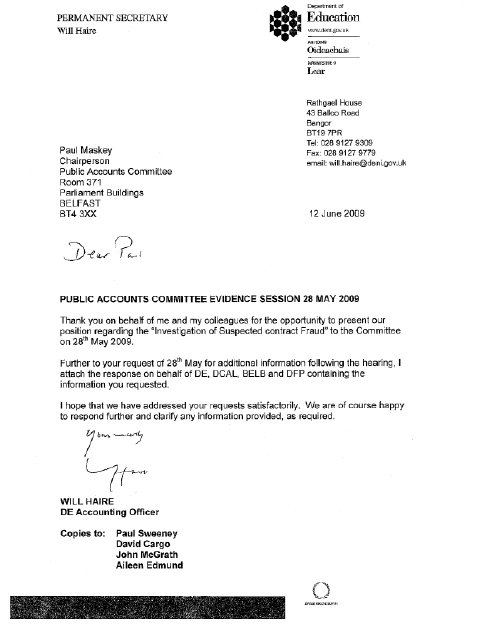
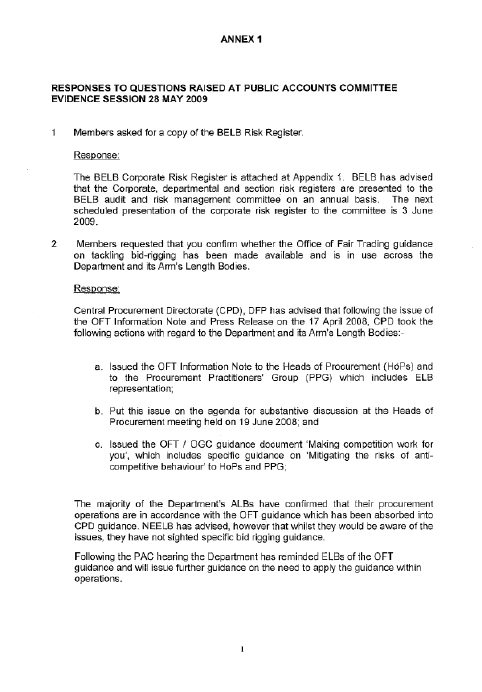
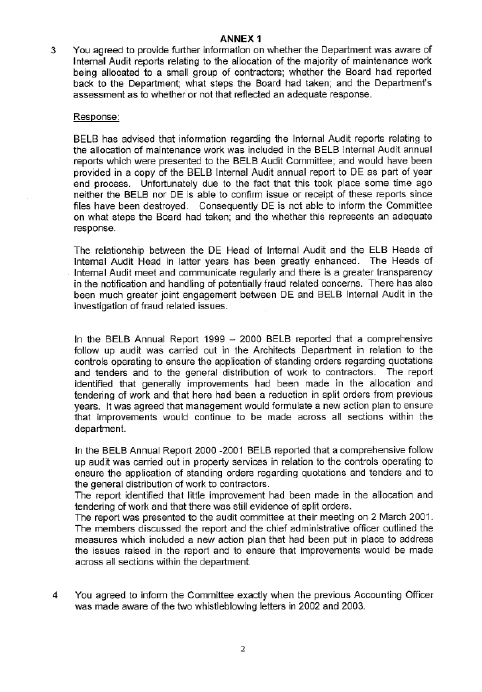
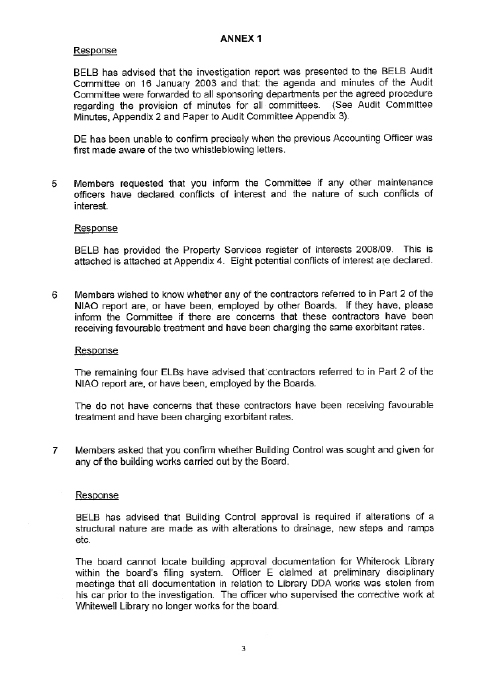
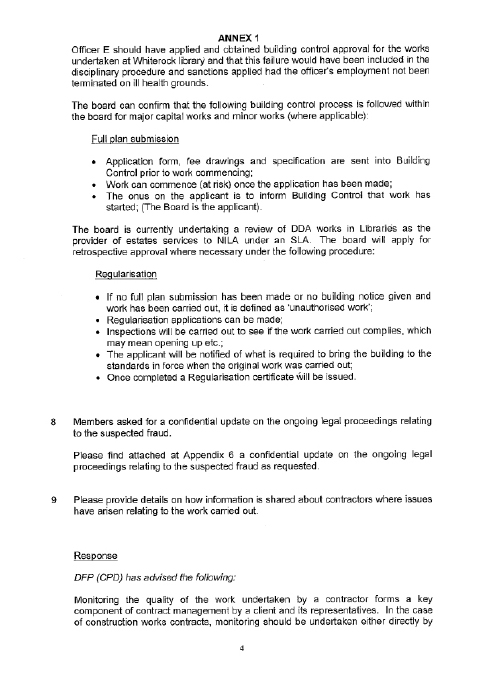
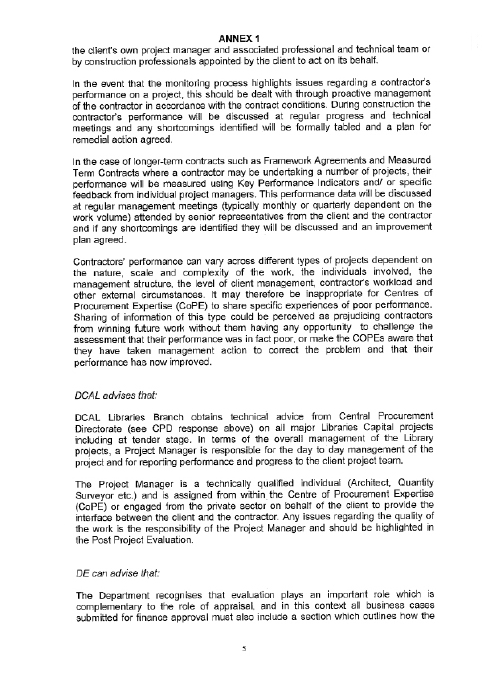
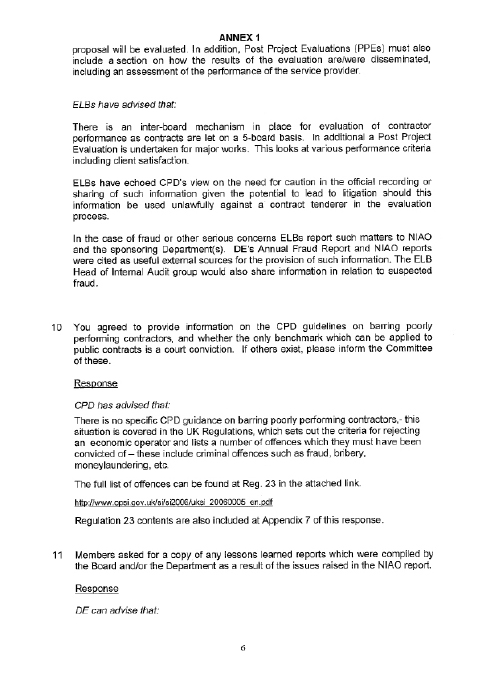
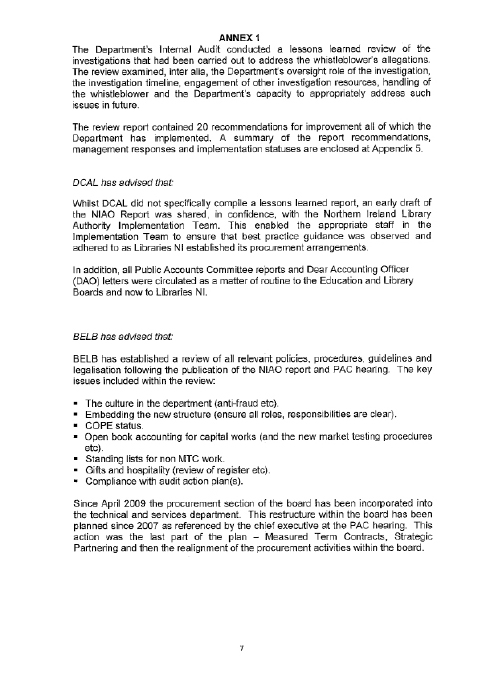

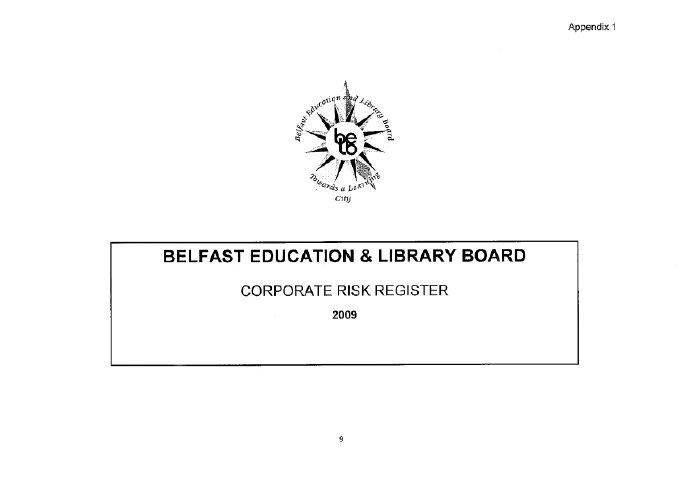
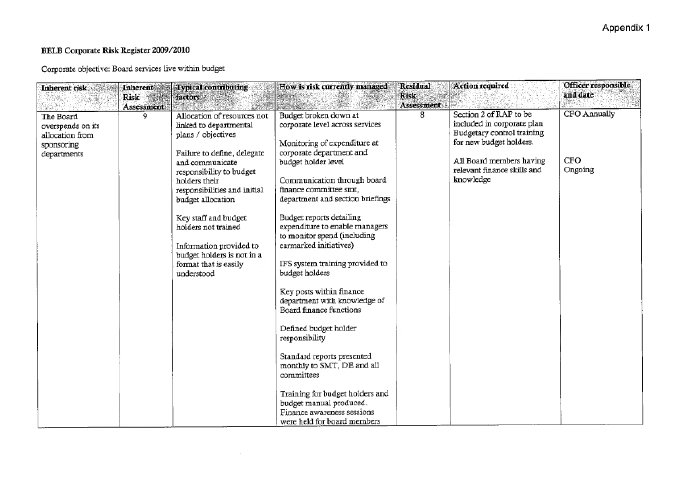
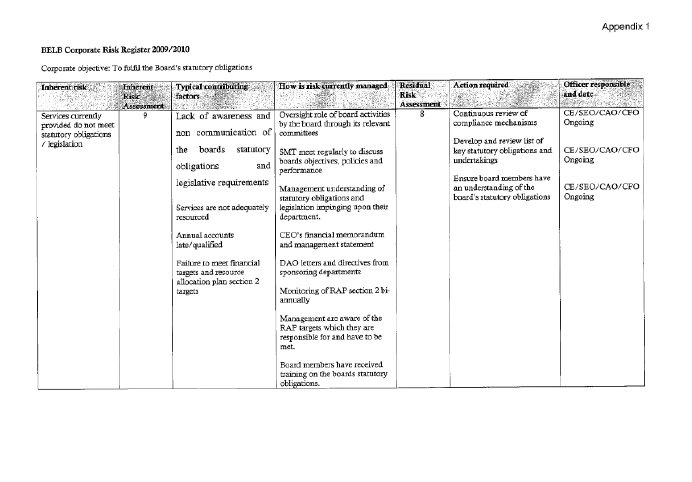
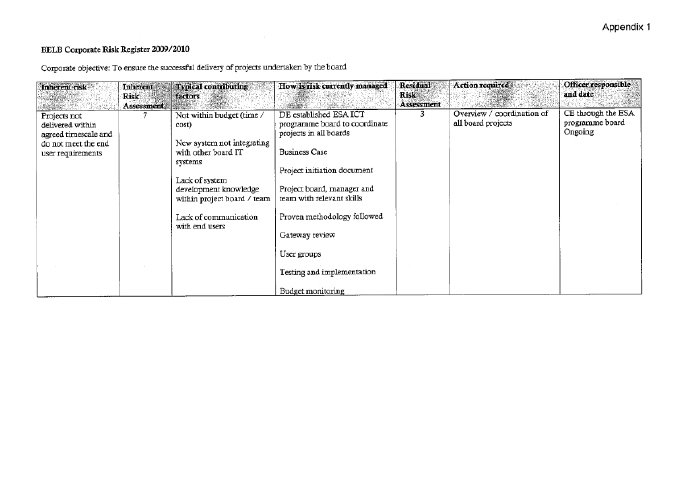
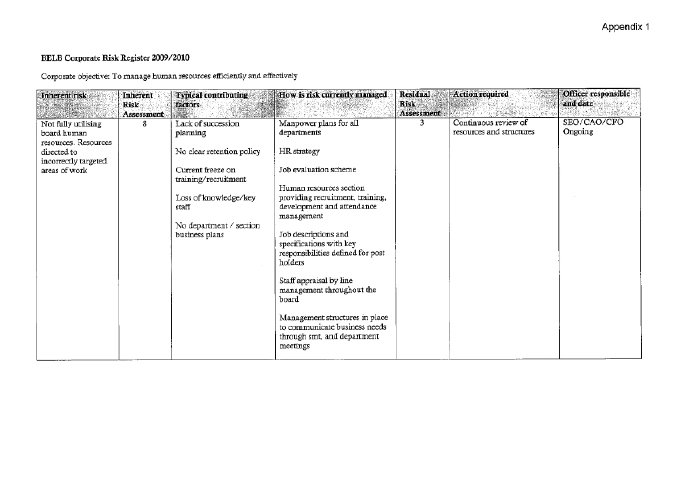
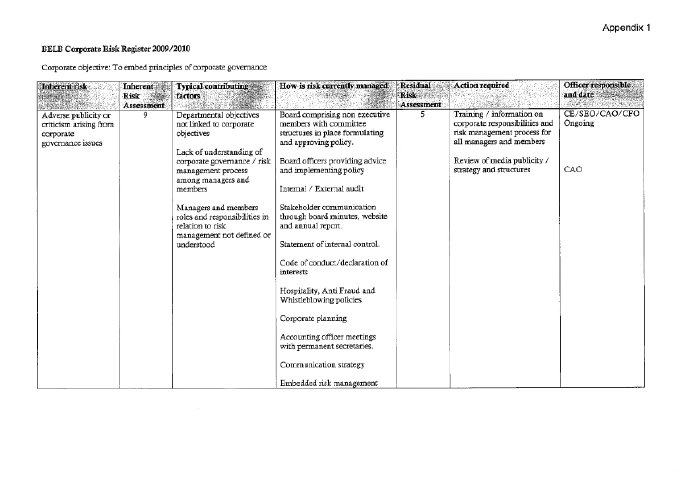
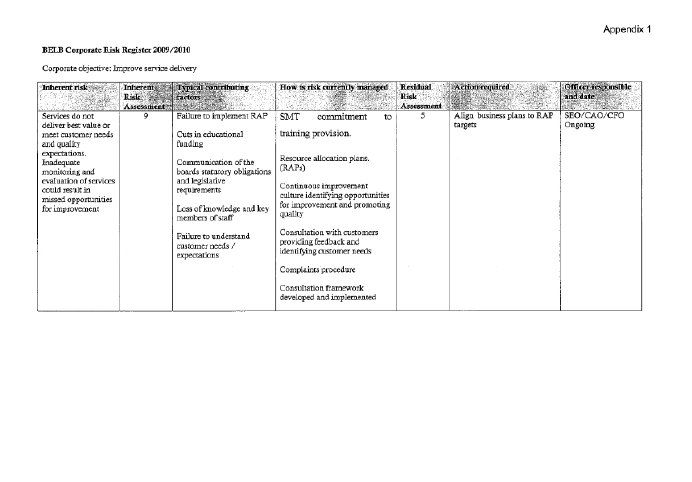
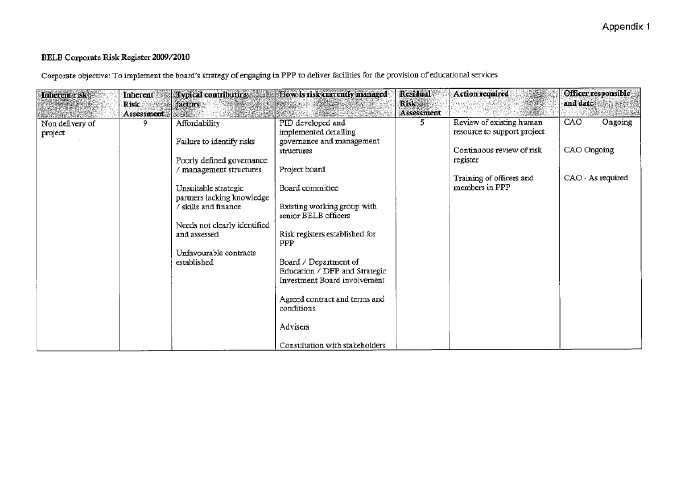
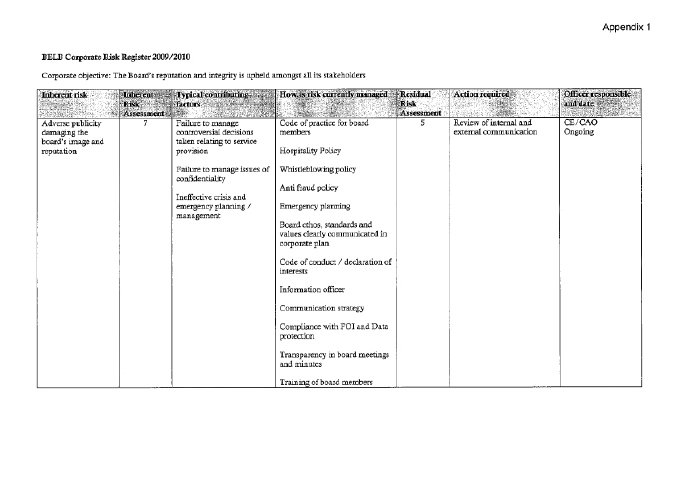
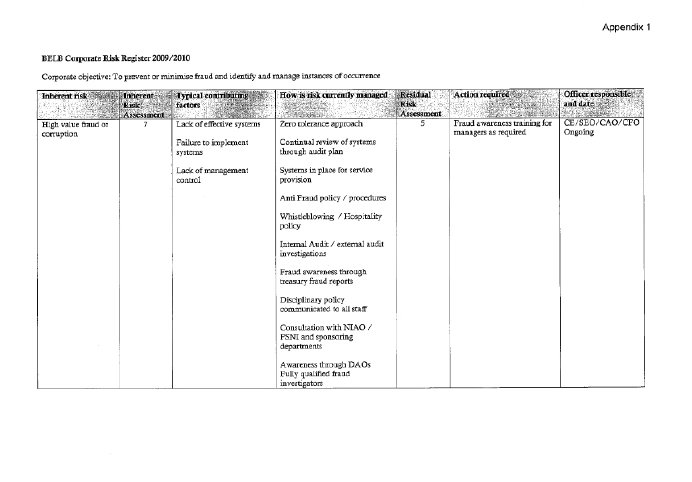
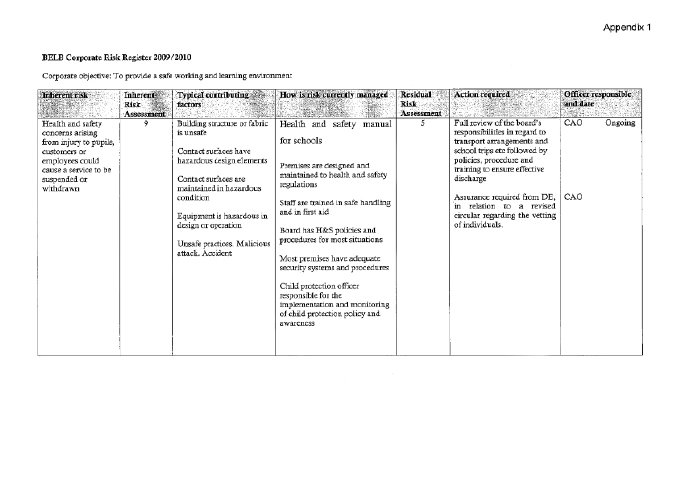
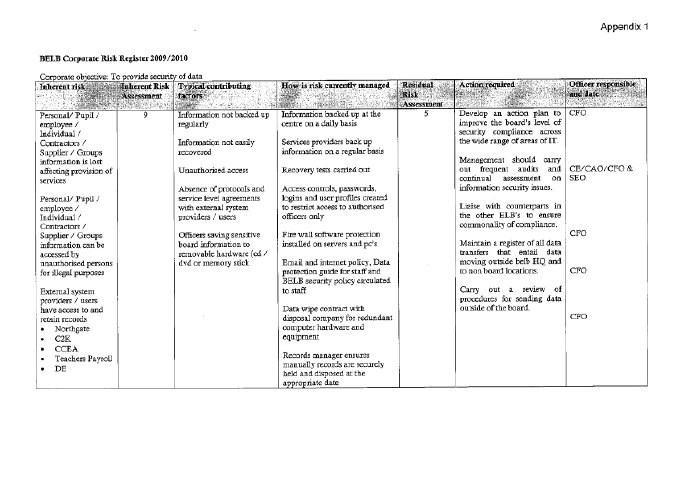
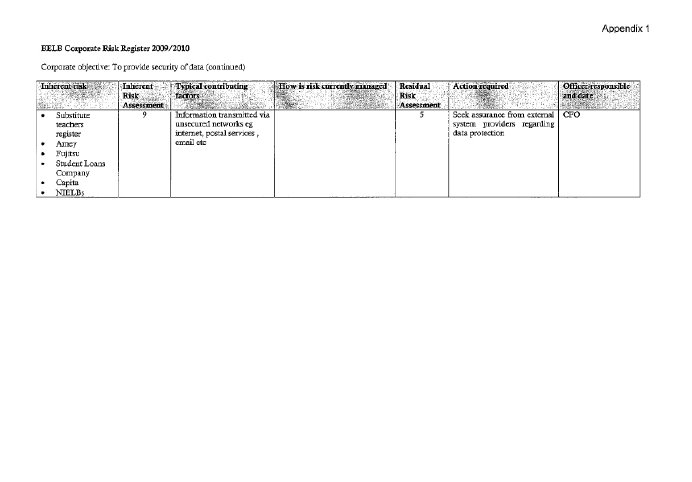
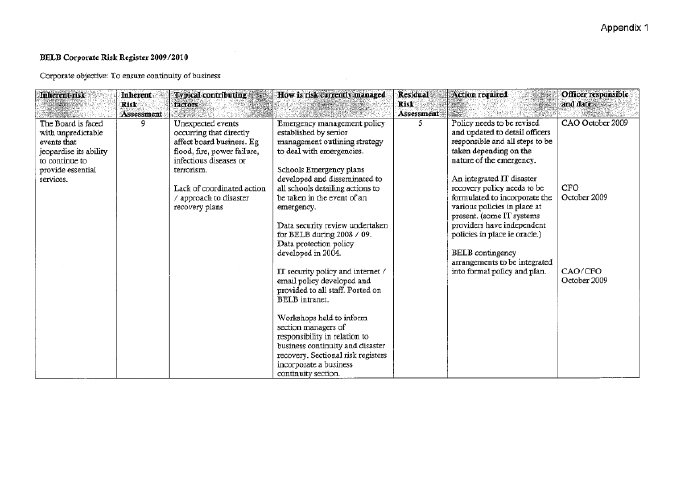
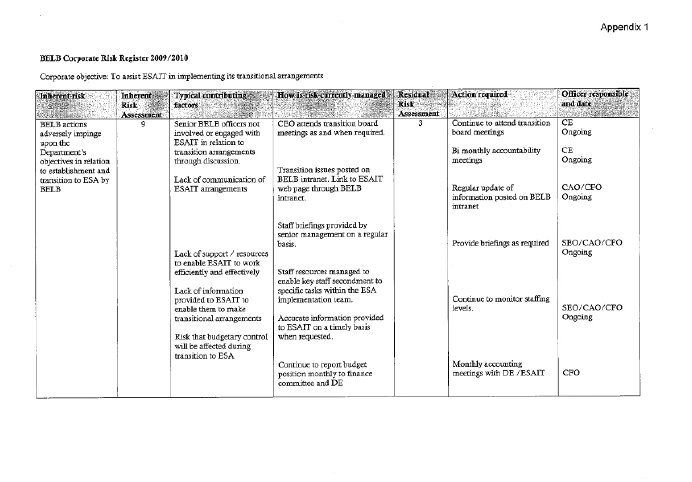
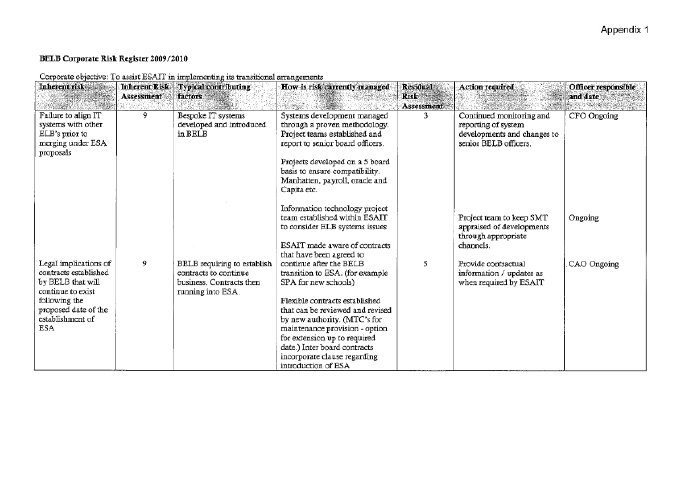
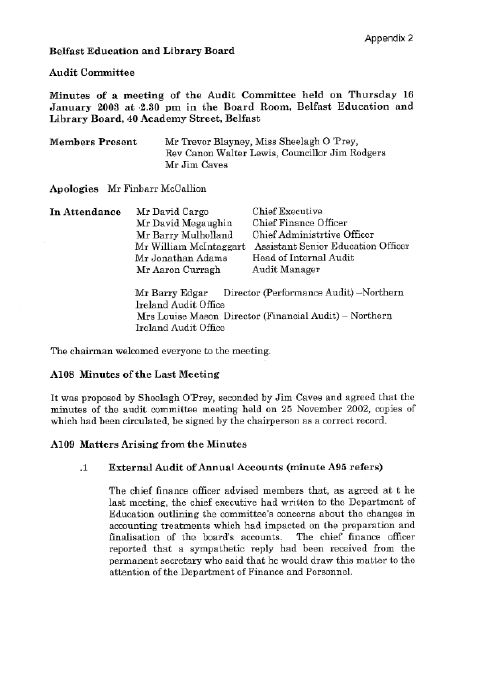
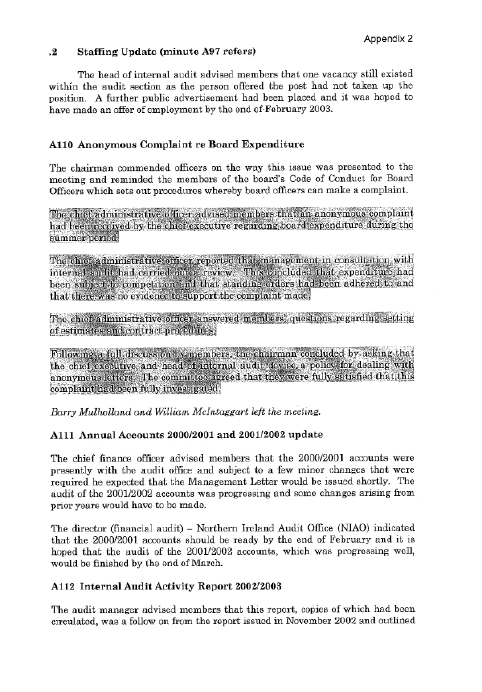
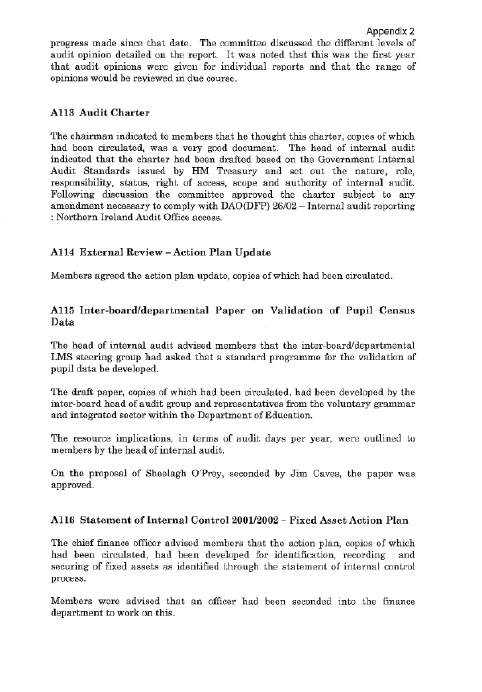
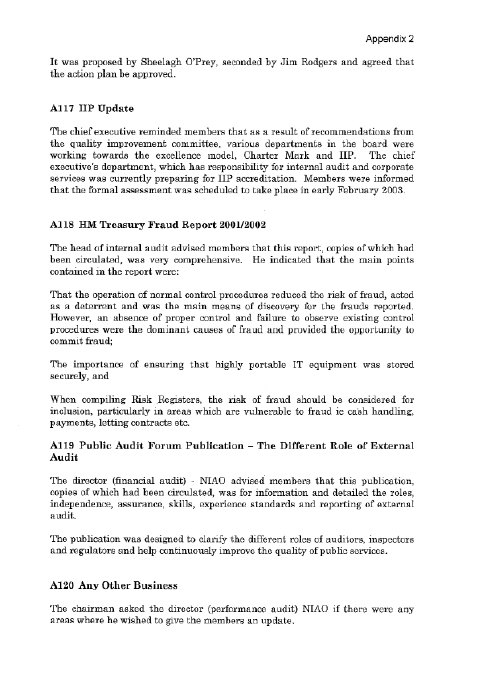
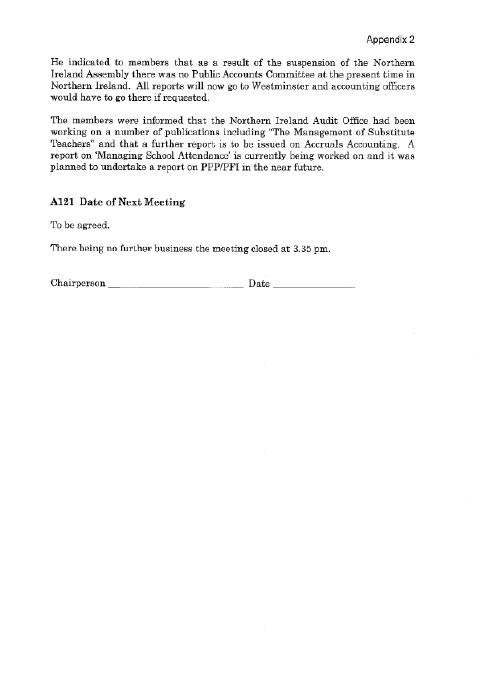
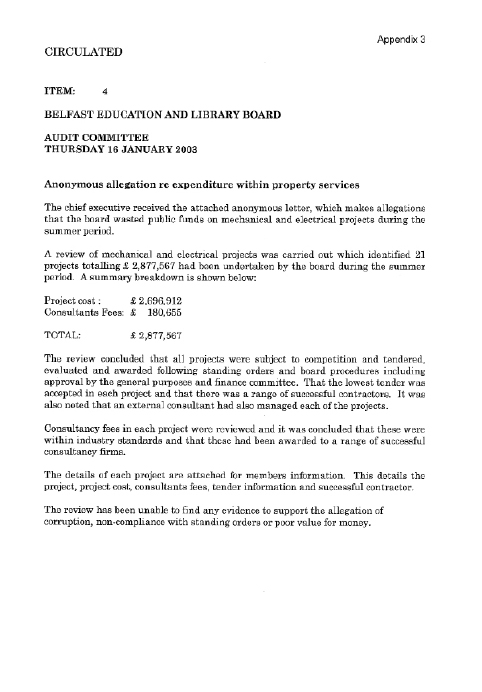
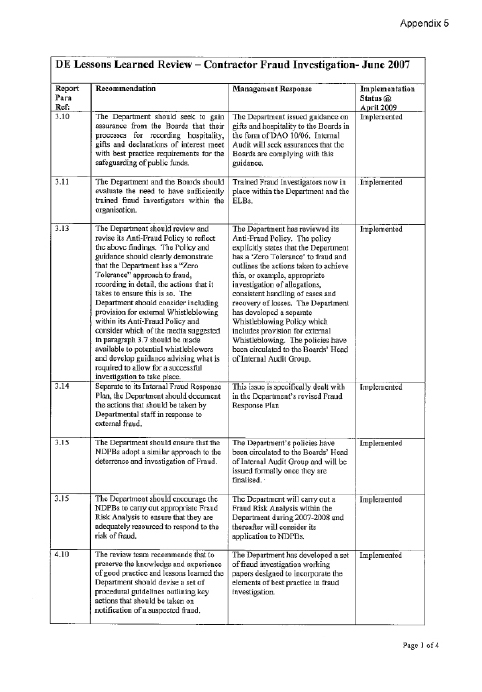
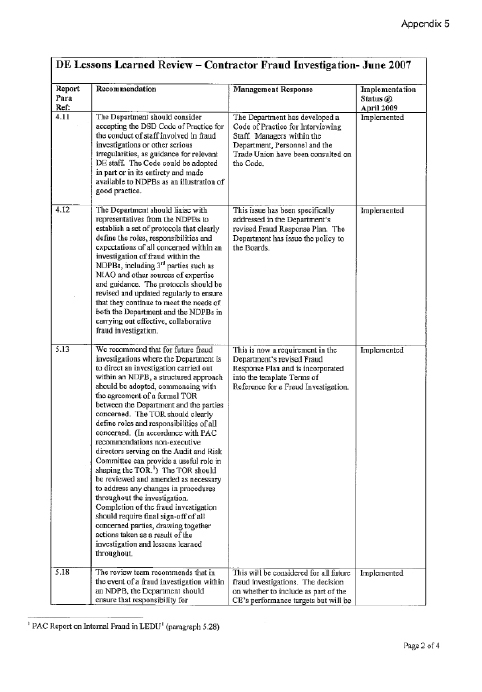
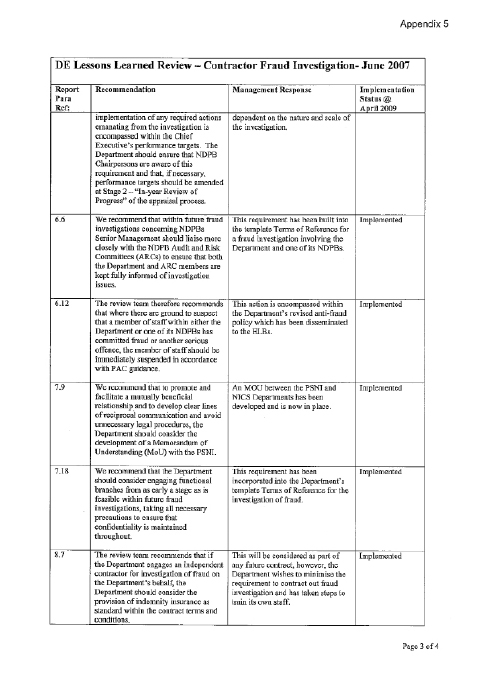
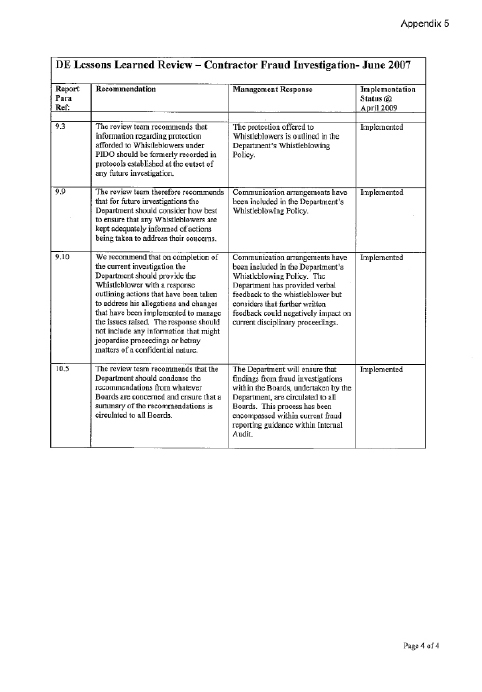
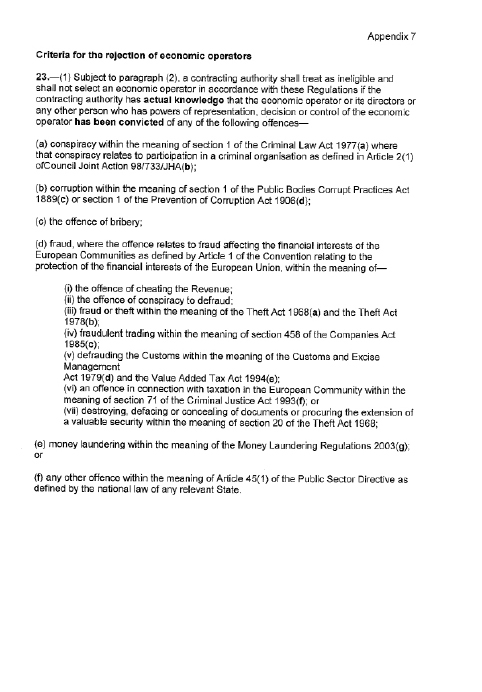
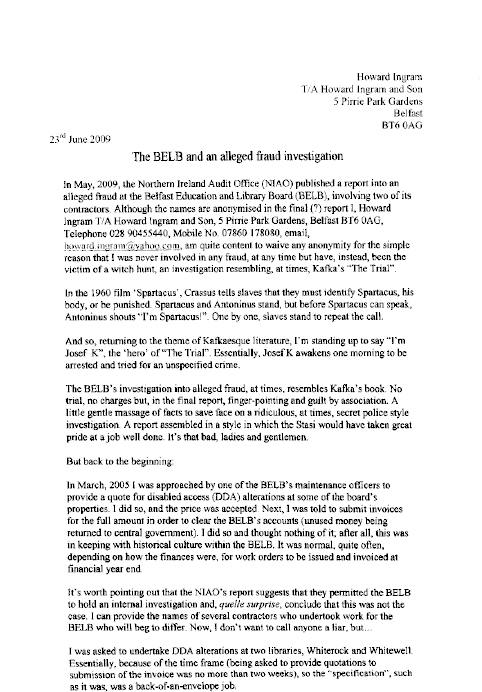
Correspondence of 23 June 2009
from Mr Howard Ingram
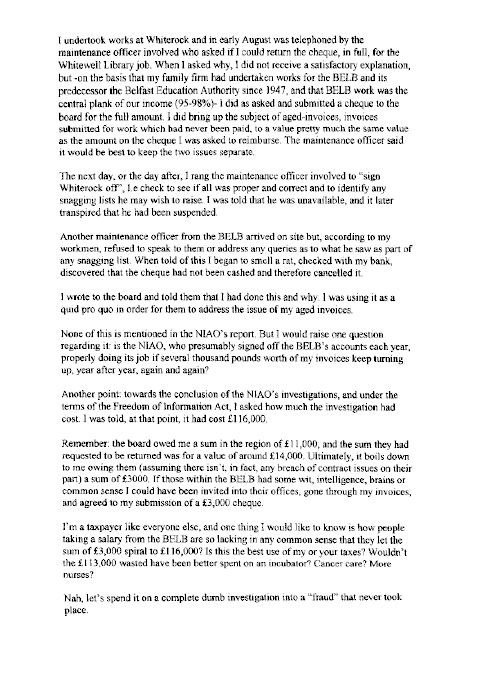
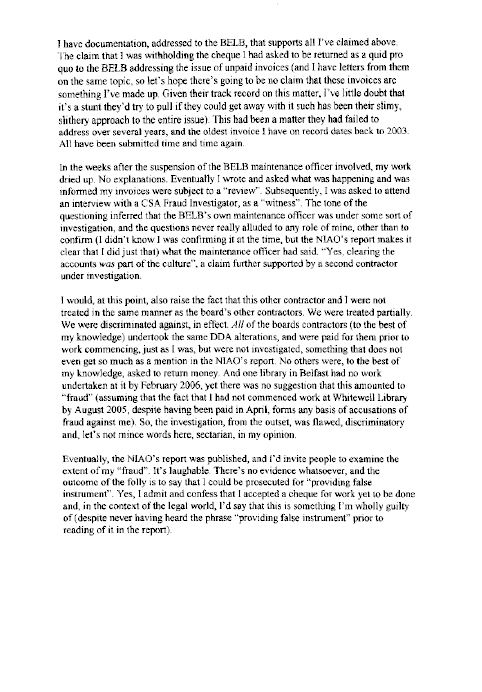
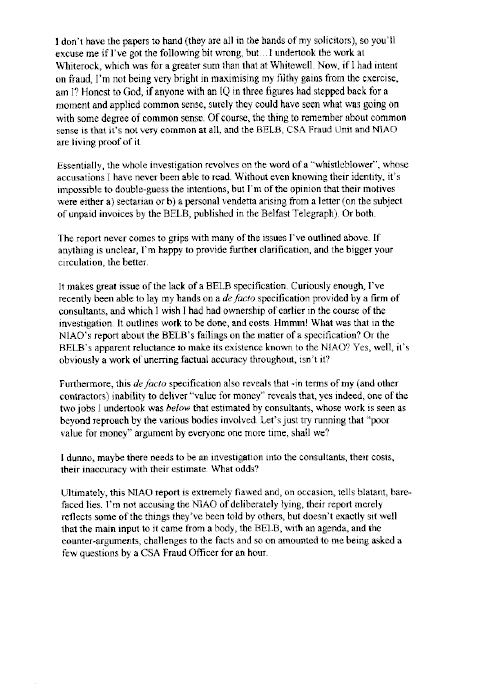
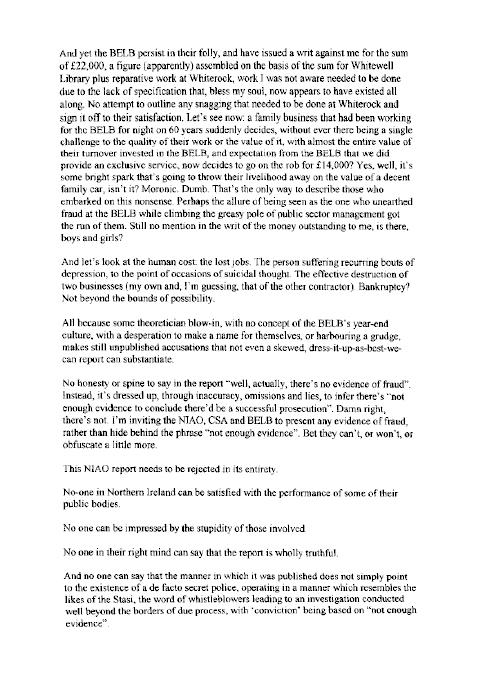
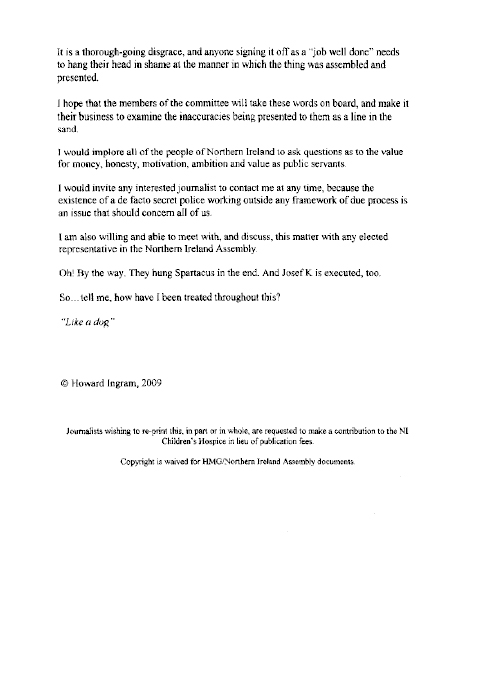
Appendix 4
List of Witnesses who
gave Oral Evidence
to the Committee
1. Mr Will Haire, Accounting Officer, Department of Education.
2. Mr Paul Sweeney, Accounting Officer, Department of Culture, Arts and Leisure.
3. Mr John McGrath, Deputy Secretary, Resources and Accountability, Department of Education.
4. Mr David Cargo, Chief Executive, Belfast Education and Library Board.
5. Mr John Dowdall CB, Comptroller and Auditor General, Northern Ireland Audit Office.
6. Mr David Thomson, Treasury Officer of Accounts, Department of Finance and Personnel.
